#its more other people refused me femininity & other aspects of being a girl
Text
bro why the fuck is understanding my gender locked behind reckoning with my traumatic childhood and the de-gendering & social masculinization i went though due to poverty and having to turn to masculinity/male social systems due to being rejected from girlhood at a young age and needed a social systems to protect myself from the consequences of being an autistic traumatized gifted student.
cant i just have a quick answer? a shortcut? without dredging all that up? without getting a PHD in gender-studies? please??
#thebirdspeaks#welcome to my ongoing gender crisis#i am a thing that exists and also technically a person#i cant even fully describe the gender i was perceived as pre-social transition#like i was a girl on paper but i was broadly treated as such so little#that i cant easily fit into seen as girl -> actually not one#its more other people refused me femininity & other aspects of being a girl#so i forcibly embraced masculinity#because you cant survive on the outside#and i was very much one of the guys#a very very extreme tomboy#and that resulted in further rejections from femininity#idk like on paper i was a girl#but i was never really treated as one#i was this in-between thing#even before i came out as trans#like before & after coming out blurs bc all that changed was transphobia#anyway#tldr my gender identity is confusing and going back to try and figure it out is needed but also messy as fuck
11 notes
·
View notes
Text

It is NOT BOY MODING. It is A TOMBOY AND It LIKES THE WAY It DRESSES.
By lain. It its she they.
It amazes me when It sees this word brought up on the internet. The term Boy Moding is used and often applied to trans women who use Boy clothing and fashion to hide the effects of HRT to be able to pass through safely without being clocked or singled out for being transgender. But it seems, at least to it, that this term often gets applied to women of it's variety without question of what they actually identify as. To it, the term "Boy moding" is rooted and based on passing culture and societal standards of what women should look like, act, think, and express themselves. For instance, I my self personally Identify as a tomboy. Which is a term often applied to cis women who have a preference for Boy clothing. This isn't to say that I don't own dresses or skirts or other articles of clothing how ever, I personally tend to pair these items with over sized hoodies, t shirts, and various crop tops that I've made over the years even before I came out of the closet. To that effect I will say that I believe there is a stark difference between subcultures within the lgbtqia+ and I am here to provide some nuance to this conversation.
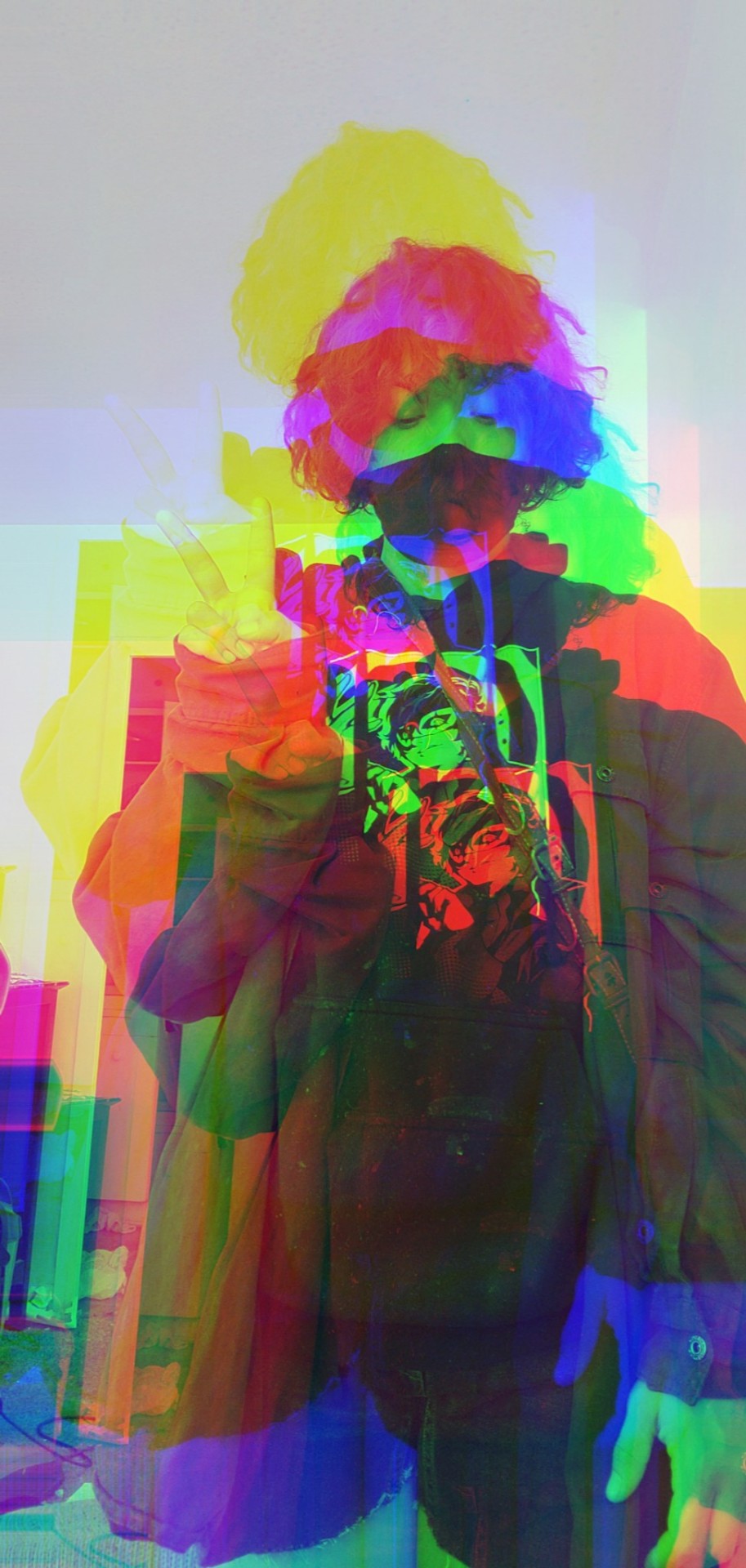
It guess you could say for my own personal identity that there is also a community behind it. There are alot of stereo types that It fits when it comes to generalizing trans women. There are a lot of girls who are actually hyper passing dolls, i.e. a few of it's friends who are in the drag community. The ones who try to blend and pass as what our society has labeled as a woman. And then there are girls like it, who embrace the more counter culture type of aspects of being a woman as well as being gender nonconforming. Girls who are like me reject traditional gender norms as well as challenge the definition of femininity. I remember one conversation that I had with my sister M. I used to be a full service sex worker and I was thinking about taking it up again and she had said, "If you really want to get back into sex work you will have to ask yourself what matters more to you, passing or being your self." That sat with me very much and she kind of got in my head about it. At first i thought, "maybe I can do both I'm pretty attractive." But then I realized that sex work really wasn't for me because I am not willing to compromise characteristics that make me a more complete person as a whole for capital.

With this being said, It believe that to help with the stigma that goes a long with being A. Labeled as a "boy moder" and B. Being misgendered based solely on the appearance of how you present your own version of being gender nonconforming in internet spaces as well as public spaces. Recently it got misgendered at work. The owner of the restaurant it washes dishes at had used second person pronouns to address it when it uses third person pronouns preferably even in the work place. When the discussion was had, the owner of said restaurant had flat out refused to use its preferred pronouns and had its identity denied. After that it had spent the whole shift crying, contemplating, formulating an escape plan because all it could think about were the times that it had its gender questioned or policed in many hostile work environments. The evidence while clearly anecdotal is a prime example of what transgender women, and trans gender tomboy women have to deal with 9/10 times on any given day of the fucking week.

To wrap things up, we discussed that The term Boy Moding is used and often applied to trans women who use Boy clothing and fashion to hide the effects of HRT to be able to pass through safely without being clocked or singled out for being transgender. How ever over the course of this post we break down the terms loosely and talk about how very prominent distinctions there are in subcultures between trans and queer people. We also talk about the ways that passing culture can effect the ways we view and perceive subcultures and how these perceptions can make it difficult for gender nonconforming people to navigate in social spaces. Now referring to itself in the first person, to me I think the term Boy moding is gross. Boy moding is a way for people to gender all of us incorrectly and keep more struggling women in the closet. If you are non binary, or any form of gender non conforming person hear this. It is okay to be a woman and still embrace masculinity. Boy clothing does not make it any less of a woman nor does being identifiably trans make it a man pretending to be a woman.
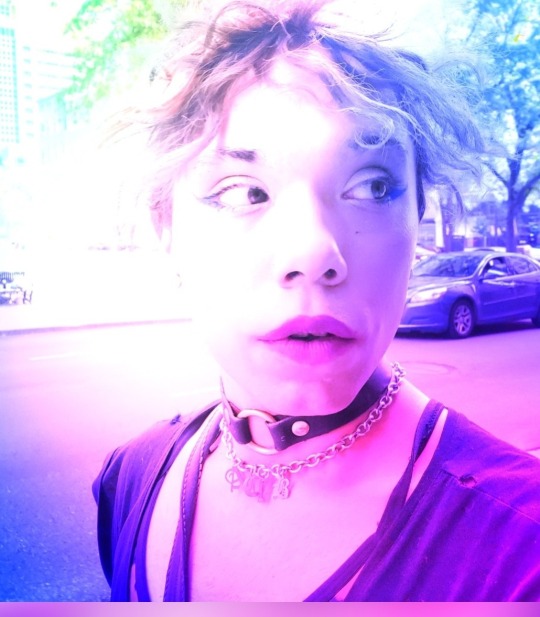
It is NOT BOY MODING. It is A TOMBOY AND It LIKES THE WAY It DRESSES.
It feels femme even though it doesn't identify as a regular human. It feels feral when the full moon comes. It likes to bite the ones it loves. It wears jeans sometimes to work or maybe sometimes a skirt. Even though it's a creature that causes alot of messes. It IS NOT BOY MODING. IT IS A TOMBOY AND IT LIKES THE WAY IT DRESSES.
6 notes
·
View notes
Note
can you please stfu about forcemasc?
i'm transfem and it has been a kink of mine FOR SEVERAL YEARS (mostly inside my head as fantasies because i was too afraid to verbalize it and share it with anybody [and with the way other transfems like you demonize it, i see why i kept these fantasies to myself for so long :/], and the recent boom in its popularity does make me happy, even if it comes from transmascs and not my own demographic.
forcefem does nothing for me because i have been naturally feminine from a young age and openly displayed that femininity. unlike many other transfems, i never repressed my femininity and i refused to conform to standards of cishetero male masculinity. so the "force" part just turns me off, because there's no erotic appeal to forcing femininity on myself as a "release" for me. because i have been openly feminine since i could talk.
however, from a young age, i did end up brewing a bitter resentment towards masculinity and men, mostly as a result of how boys and men treated me for refusing to be masculine and being feminine as an amab.
i was already non-masculine by default, but their abuse and scorn as a reaction to that only made me despise masculinity and all things male even more.
even though i don't believe misandry is real, i began calling myself "misandrist" and adopted radfem-lite beliefs (unsupervised internet access as a kid is a blessing and a curse at the same time).
i began hating boys and men so much, which soon caused me a great deal of pain, because when puberty arrived, i discovered i was sexually and romantically attracted to them.
this contradiction of being attracted to boys/men, but also hating them because i believed they were inherently cruel violent mean and evil caused me SO MUCH PAIN as a teenager, on top of the dysphoria i was already struggling with (luckily i had a pretty weak puberty but i was still dysphoric about my height). i felt like a hypocrite and a pathetic coward for falling in love with the same people who tormented me since i was a kid, because i thought all boys/men were violent and evil by default, because i thought that was what it meant to be a boy/man.
what does this have to do with forcemasc?
forcemasc is a fantasy for me. it's therapeutic for me. it makes me feel more comfortable in my skin.
it's a "release" for me in the sense that enables me to let go of these unhealthy, hateful beliefs i've held since i was a child (which only end up hurting me), and also feel at peace and more accepting of my attraction to men, as well as discover new sides to who i am.
the idea of trusting a partner enough and us being intimate enough for me to allow him to make me explore a more masculine side of myself when i am with him is a very powerful fantasy to me. not only do i feel at ease with his natural masculinity, but also with myself uncovering different aspects of my being which are masculine. and both of us are being masculine together in that moment and deepening our relationship that way, even though he is a man and i am still a trans woman. i trust him enough to display a more masculine side of myself around him.
because imo, most people, regardless of gender, have both feminine and masculine traits. and even if i am 99% feminine and was completely avoidant of masculinity my entire life, the "forcemasc" kink is all about connecting with that 1% and deepening my bond with my male partner in the process.
"i'm sick of everything from needing a masc alternative" and i'm sick of you girls thinking transfem experiences are monolithic.
even if i'm the only transfem in the world who likes forcemasc (which i highly doubt, but whatever), i deserve a space for my fantasies.
please don't rain on my parade.
youre actually not allowed to be into forcemasc until the other trannies are allowed to be into the freak shit that we're into. that's just first of all don't even say anything like that to me. the more asks i get like this about the generalized posts i made while high at 10 am and would certainly make again while high at 10 am, the more i'm forced to keep talking about it.
not only am i going to rain on your parade, i am going to piss all over it until it stops trying to suffocate mine. if your fucking parade would move a block over onto a different street, it'd be just fine.
1 note
·
View note
Note
character ask game with botw link?
One aspect that I love: I really love how purposefully androgynous they made this version of Link. With every other version of the character all of their voice lines consist of wordless yelling and stuff like that (aside from WW Link's meow), but botw Link laughs and has a noticeably lighter/ higher voice than the rest of them. Not to mention his character model is very short and made to make him look gnc af. also there's a whole major part of his quest that relies on him being able to pass as a girl and he blushes when he's called cute in the clothes BC IT'S NOT DEMEANING TO DRESS FEMININELY!!!
One aspect that I wish more people understood: I think people don't think hard enough about his lack of emotions in the cutscenes, they literally explain why he's like that, why he doesn't talk and everything. He's supposed to be seen as cold and unfeeling because it shows how different he is after the Shrine of Resurrection. He has snarky dialogue and he gets excited to cook and he can shield surf when before the Calamity it's so obvious that he's this soldier trained from childhood to reject his emotions and do what's needed of him.
One (or more) headcanons I have: There is no way that this little dude is cishet. I refuse to believe it. But I can't decide on my favorite gender headcanon for him but I usually default to him being genderfluid. I do really love ftm and mtf trans headcanons and nonbinary headcanons for him too. I think he deserves all of the gender. I also like to put him on the aroace spectrum, but at that point I'm mostly projecting. I just think it's funny that in game there are so many girls who are attracted to him and he just... doesn't understand at all. Like Mipha and Zelda and Paya and the arrow lady all write in their diaries about him and I think it would be fun if he just didn't get the hint at all.
One character I'd love to see them interact with: Outside of his game? I think he and Midna would commit crimes together and it would be funny. Also I really like it when things like fanart and fics include TP Link because he's there as Wolf Link and I think it would've been nice if he could turn Hylian in the game to teach him things but instead he's a dog who kills everything that he sees and gives me a heart attack while distracting guardians. This dog makes me way more anxious when fighting bigger monsters.
One character I wish they'd interact with/ interact with more: Riju, 100%. I think they should've added the fact that he had a family to the game including a little sister who Riju subconsciously reminds him of so it would be nice if they had added some big bro moments with him. You know that they would get along to the detriment of Buliara.
One or more headcanons I have that involve them and one other character: Him and Zelda have the same amount of cryptid nerd energy. Like they both had some before the Calamity, she tried to make him eat a frog and he literally ate rocks and kicked the asses of full grown knights at the age of four, but Post-Calamity? after he had been resurrected and she had spent a hundred years fused with the goddess? They're both fully weird now and they don't care what other people think of them at all. They also have different flavors of inhuman-ness. Like hers is more divine and ancient and powerful and his is more wild and monstrous and new. If that makes sense. Idk he's the nature spirit that connects with animals and strange creatures and plants and she's connected to the goddess so she has dreams of the future and sees everything differently than everyone else. They're weird and its super obvious.
#this ended up a lot longer than I thought it would be#sorry#ask game#character ask game#ask gay#botw#botw link
35 notes
·
View notes
Text
So I saw this post while browsing toa tags the other day. While I don’t think being obsessed with the school mascot automatically makes Toby a furry (though it is funny to joke about lol) since “being a furry” actually just means “being a fan of anthropomorphic animals” and doesn’t necessarily require any form of costuming or interest in such, it did get me thinking, hmmm...if he was a furry, what would his fursona be? 🤔 And from there I started wondering what Jim’s and Claire’s would be as well because y not ¯\_(ツ)_/¯
BUT WAIT, I hear you say--haven’t you already drawn the trio as werewolves and wolfwalkers etc.? Wouldn’t those be their fursonas??
Well yes....but actually no.
I guess it’s a little hard to explain, but there’s a nuance between “[person] but as an animal” and a proper “fursona”. While a fursona is an animal character used to represent its person, it doesn’t have to physically resemble them at all as you would expect [person]-but-as-[animal] to. For example, if you were to design me but as a cat, you’d probably give it light brown fur and green eyes like I have irl. But my fursona, unlike my human self, actually has blue fur and purple eyes. You can give your fursona matching physical traits to your own if you want to, and some people do, but most use only a pinch of their irl appearance, if any at all.
The choices people make when designing their fursonas vary wildly from “it looks like me irl” to “it looks like who I want to be” to “I just really like this color scheme” to “this particular color/marking holds deep personal meaning to me” to “this particular pattern represents a particular defining moment in my life” to “idk it looks cool and i vibe with it” etc. etc. etc. Everyone has different reasons of varying depth for the decisions they make in designing their fursona.
Therefore, to design a fursona for Toby etc., it’s less a question of “what would this character look like as [insert species here]?” and more of “how would this character choose to present himself with his own [animal] character?”
And that’s a much trickier game than just transferring a character aesthetic to a new species. ^^; We have to kinda dive into the characters and makes some guesses about how they, if given infinite creative freedom to design an animal avatar with no rules or limits, would choose to present themselves.
So all that said, here’s what I came up with:
Starting with Toby because he’s the one who inspired the post. I think Toby might choose a wolfdog fursona. A lot of people who choose wolves as fursonas consider themselves to be overwhelmingly loyal to their friends, a trait that fits Toby very well. However, while Toby likes to be “cool”, I don’t think he really thinks of himself as much of an “alpha” type--he’s more of a sidekick, and he knows that, and he’s ok with that. He’s the wingman. So what better way to incorporate that than to add dog into the mix? Man’s best friend=Jim’s best friend. Sociable, humorous, and unwaveringly loyal. Wolfdog it is!
With the species decided, we can move on to the design itself.
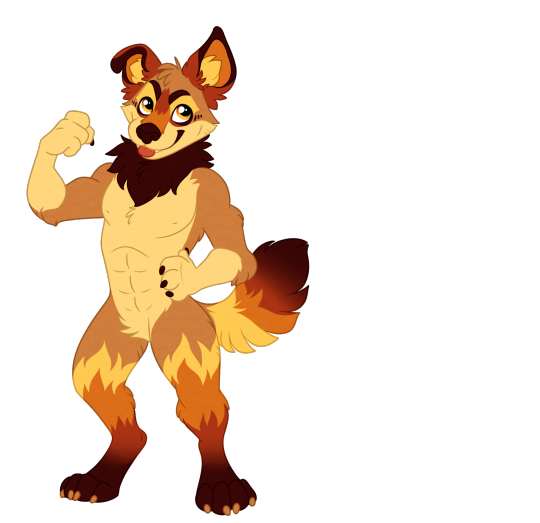
I can’t imagine any form of Toby in anything other than warm colors. This is extra emphasized by the flamelike patterns on his legs and tail, which both speaks to his desire to be totally awesome-sauce as well as acts as an allusion to his flaming warhammer. It’s fairly common (not universal, but common) for people to give their fursonas a more “ideal” physique than the person actually has as a sort of way to live by proxy physical goals or fantasies they’ve been unable to attain irl for whatever reason. Given that we’ve seen Toby struggle with fitness from time to time, it wouldn’t shock me to see him take this route. His wolfdog self is still relatively short and stocky, but it’s all muscle, babey.
This fursona is strong, fun, boisterous, and generally just kicks butt. Concentrated awesomesauce flows through his veins. Just don't mess with his friends, or you’ll feel the flames!
.
Moving on to Jim. Jim was the hardest to nail down, and most definitely the hardest to keep my personal biases out of oof. Which I may have failed to do anways because yes, ok, I made my favorite character a blue feline, sue me ¯\_(ツ)_/¯ But hear me out first!
For Jim I ultimately settling on a cheetah/lion hybrid.
Cheetahs, in a way, are sort of the underdogs (er...cats?) of the feline world--at least, in their local ecosystems. They are built wholly for speed, not strength--and as such, just about every other large predator in their environment has them beat when it comes to raw strength. Remind you of a certain Trollhunter? plus the long lanky legs. don’t forget those lol
However, because of this disadvantage, cheetahs...usually surrender. They know it’s not worth it to defend their kill from larger, stronger opponents, so they’ll give it up and just catch something else. This aspect doesn’t quite fit our protective, selfless protagonist all too eager to risk everything to save his loved ones--so a pure cheetah may not be the right choice.
So what animal is brave and protective? That’s where the lion part comes in, of course!
Why not just make him a pure lion? Well, a little similar to making Toby a wolfdog instead of a pure wolf. A straight-up lion feels a little too “chad” for our sweet Jimbo. Too much of a jock.
Jim has the humble underdog nature of a cheetah as well as the bravery and fierce protective drive of a lion. Cheelion? Leetah? idk, but let’s design it!

Like Toby and warm colors, I don’t think I can possibly associate Jim with any color but blue. While it’s never directly stated, given that we’ve never really seen him wear any other color (with the exception of the Eclipse armor), I think it’s pretty safe to assume that that’s his favorite. Blue sweater, blue jeans, blue shoes, even his backpack and bedsheets are blue. So naturally, his fursona would be predominantly blue as well! Plus some yellowish accents to (somewhat) match the natural colors of his chosen species(s).
I imagine he originally designed the character without horns, but then added them after becoming the Trollhunter, since it became such a major and impactful aspect of his life.
His lion’s mane also continues down his back in imitation of the “mantle” found on baby cheetahs. This youthful feature could subtly represent the fact that he’s been forced to grow up too fast and take on so much responsibility so young--so his fursona can still be young and carefree as long as he likes even while his real self struggles with the weight of the world on his shoulders.
This fursona is relaxed, calm, and confident. He’s not just cool--he’s crispy!
.
Lastly but not leastly, we have Claire. Out of the three, I think Claire was actually the easiest to choose--or at least, I had the clearest idea of what I thought she might go for.
Claire is a bit of an interesting duck, because while she’s shown to be fairly popular at school, she’s definitely far from the stereotype of The Popular Girl™. Yes she’s smart and pretty, but she’s also a little spunky or even a bit quirky--she’s a theatre kid, she’s a huge fan of hard rock band Papa Skull, and while I wouldn’t quite call her “rebellious” per se, she’s certainly willing to bend some rules if she feels the situation calls for it (not telling her parents that she was going to the concert with Steve, literally sneaking into Jim’s basement to try to find out what was up with him, etc).
That said, I think Claire might go for a hyena fursona--something a little out of the box, but not totally out of left field. (she also shows a slight Gurl Power™ streak here and there “the staff was not meant to be wielded by man--” “I am not a man!!!”) and if you know anything about hyenas...well, yeah lol)
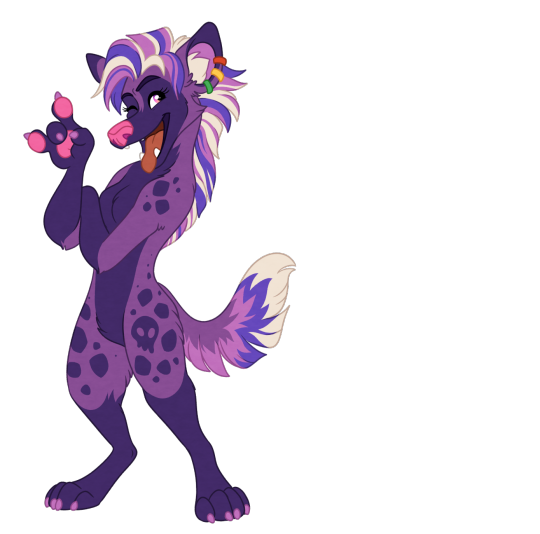
I think Claire would lean into her punk-rock “rebellious” side with her fursona design. This character is completely free of the pressure of being the councilwoman’s daughter and having to maintain her mother’s public reputation, and thus allows Claire to express a less restrained side of herself. She has a bold semi-edgy color scheme with bright accents (and some earrings to match her person’s hair clips) while still remaining feminine and (her own brand of) fashionable.
This fursona is spunky and sassy; she’s spicy and sweet all rolled up into one. She knows what she wants and she’s not afraid to chase it down. She lives her own life and she’s dang proud of it.
.
....sooooo yeah there’s my take on what Toby’s, Jim’s, and Claire’s fursonas could hypothetically be. And I guess since this post was inspired by a joke about Toby’s infatuation with the school mascot, here’s just some quick thoughts on how they might approach fursuiting to end us off:
Jim I don’t see as much of a suiter. He might try it once or twice if given the opportunity, but at the end of the day it’s not really his cup of tea--he’d rather act as the “handler” for his friends, if anything.
Toby and Claire, on the other hand, I could definitely see as suiters. In fact, with her interest in acting, Claire would probably particularly enjoy it--she’d be one of those suiters who really gets into character, absolutely refuses to break the magic publicly (outside of any actual medical emergency), and popular at cons because she just performs so well.
Toby, meanwhile, would be the more chill type--uses his normal voice in-suit, isn’t really too stressed about “breaking the magic”, just kinda hanging around like he would normally except “look I’m a talking dog, cool right?”.
also while I was typing this it occurred to be that since Eli is canonically a cosplayer then he could be a fursuiter as well; in his case i imagine he actually made his own suit it’s a protogen and it’s full of little LEDs and other electric gadgets, it’s not the prettiest thing ever as sewing is not his forte but boy did he try!! good for him. good for him
#so anyways I put way too much thought into this...enjoy I guess?#trollhunters#tales of arcadia#toby domzalski#jim lake jr#claire nuñez#furry#my art
63 notes
·
View notes
Text
in honor of more people sticking their heads out of their asses and finally realizing that Ginny Weasley does NOT deserve the label of being called “not like other girls” and “making fun of femininity bc she disliked fleur at one single point in her life when she was fifteen fucking years old”, or aka, the absolute headassery that was forced upon her recently (and if you think that she does deserve it, tag me and I won’t hesitate to argue back),
I hc that despite not being too particular about how she looks, if there’s one physical aspect about her that Ginny is most confident about (and yes, even she’ll admit, a bit vain, but hey, let’s not pretend we all don’t strike funny poses in the mirror like that while no one’s watching), it’s her gorgeous hair.
and the way it shines in the mfreakin sunlight every single goddamn day.
I just KNOW she spends a lot of quality time slathering it up in some L’Oréal Voluminous sulfate-free Shampoo with its complementary leave in conditioner.
I just KNOW she wears those silky masks before she goes to sleep every night bc FUCK risking cotton frizzing up against her hair,
and if she does see a single frizz the next day, she’ll lick her fingers once and apply some coconut oil to pull the offending piece down until it’s flat once more.
(Hermione looks at her while she does this and snorts while smirking, “And they call me the compulsive one”)
I just KNOW she refuses to flat iron a single strand bc even if she does get some frizz, sue her for getting too paranoid about killing the ends, so she doesn’t bother with it even when her mother gives her a weird look the next day when her head resembles something like a not so parched camel at breakfast.
(Ginny acts like she doesn’t care but as soon as the plates are put away, she runs to the bathroom mirror and tries to fix it immediately)
I just KNOW she has a love-hate relationship with the summer heat and yes, that is one of the only times besides when she plays quidditch that she pulls it up in a ponytail even though she’s angry bc she is so so proud of her hair & she doesn’t care what you think.
I just KNOW that the very first time Fleur compliments her during the summer before 6th year, it’s about her hair, & that’s also not-so-coincidentally the first time Ginny returns it, stating genuinely, “Er…thanks. Yours is really nice too.”
(bc she just loves her hair so goddamn much & she and Fleur continue to exchange tips from that point onwards, “Try those plastic scrunchy things to pull your hair back, trust me, it works wonders”.)
I just KNOW that if Harry effin clueless Potter reaches over to play with her hair lovingly, she’ll sit there all tense-like until he looks at her and laughs, “You want me to stop touching your hair, don’t you?”
And she’ll retort immediately, brushing her locks as if they were the babies she (always) had and she’s still adamant about this even years and years and freaking years later bc why the eff wouldn’t she be, “Yeah, Potter, you may not care much for your hair but that doesn’t mean we all don’t have our standards.”
And from then on, Harry mindfully resorts to rubbing her neck and playing with her fingers instead but never, NEVER her hair because after facing Voldemort, he doesn’t have another death wish, thank you very much.
….
And the only time she ever allows him to touch it is when he’s pulling it.
…..
But the rule is that as soon as they come back down from seeing stars, he has to comb it PRECISELY back the way it was - which is NOT the punishment Ginny thought it would be to prevent him from messing up her hair, bc Harry simply loves touching it whenever she lets him even if it is just to comb it.
(And if he manages to lace a few silky smooth strands in between his fingers while he’s doing it, well, he’s definitely not complaining.)
Basically:
Ginny Weasley and her Case of Never Having a Bad Hair Day ‘Cause She Simply Won’t Allow It and That’s Enough of a Reason for Anybody, Really.
That red hair don’t shine and dance like flames bc she uses Pert Shampoo, y’all. Let’s be real.
#fleur and ginny love#ginny weasley#hinny#harry x ginny#ginny weasley defense squad#srsly y’all if you threaten to cut her hair#she’ll cut you#headcannons#harry potter#the only person who might love her hair#more than she does#is harry#and that’s saying#a lot
33 notes
·
View notes
Text
“In the 1910s and 1920s, some people took particular offense to short skirts. Others were more disturbed by the sleeveless tops, delicate fabrics, and sheer stockings that young women fancied. Still others judged short hair the most troubling of fashion innovations. Yet no matter which aspect of the new styles they found more provocative, critics shared one fundamental conviction: They believed modern fashions to be part of a broader rebellion against conventional gender arrangements and therefore inextricably linked to the issue of female emancipation. Whether they talked about short skirts or short hair, they generally agreed that the new styles made women "much freer" and "more independent," both physically and psychologically, and that the reason for their enthusiastic embrace of the modern fashions lay in this fact.
In the years since then, both popular and professional historians have tended to reproduce this belief. With few exceptions, they have presented postwar fashions as a sign of young women's refusal to accept the constraints of nineteenth-century femininity and as evidence of their insistence on new physical freedoms. Like commentators at the time, they have emphasized the ease and practicality of the new styles, assuming that it was these qualities that held particular appeal to young women in general and working women in particular. Such claims are not without merit. When asked why they liked the new styles, many women who embraced modern fashions in the 1910s and 1920s pointed to their simplicity and convenience.
In retrospect, Henny Nedergaard, for example, explained that "old-fashioned dresses were so complicated. I remember in my childhood, it took forever for my mother to get dressed. The modern dresses were much easier. You just slipped them on—that was it." Charlotte Hansen also described the older styles of female dress as confining and appropriate only for a sedentary existence. "Our generation was different," she explained. "We were not content to just sit still and do nothing. Corsets and stays, that was not for us. We did not want to wear all those heavy clothes. They just did not fit us." According to Edith Jensen, the new styles "made it easier for women to move."
"Short dresses were much more practical," added Lily Enevold, "especially if you had to work. You couldn't really work in those long dresses." Some women endorsed short hair for the same reason. "Who in the world had time to comb and brush and put up long hair," Henriette Marie Markfeldt wanted to know, "when you had to be at work at seven o'clock in the morning? No, short hair was a lot easier." To deny that the new styles were in fact easier and more comfortable than the restrictive, corseted fashions and the elaborate coiffure of the nineteenth century would be pointless.
But to argue that the new fashions freed women from physical restrictions and eliminated time-consuming grooming would be equally untrue. Short, narrow skirts did not exactly promote free and unrestricted mobility. Neither did the high heels that became so popular in the postwar era. Silk stockings may have felt more comfortable than the older wool stockings, but they were also more fragile and more frequently in need of mending. Similarly, short hair may have required less daily attention, but it demanded regular trimming, and when curls and waves became the new fashionable norm, most women had to spend considerable time, not to mention substantial sums of money, at the hairdresser.
In addition, the new fashions demanded a slenderness that had not been a requirement for older generations of women. As fashion historian Valerie Steele has pointed out, stylistic change applies to bodies as well as clothes, and with the new, slimmer lines in women's clothing went slimmer female bodies. From the beginning of World War I, when the new fashionable styles first gained popularity, the "tyranny of slenderness" thus began its ascendancy over all women who wanted to be in style. In the postwar decade, this led to an unprecedented emphasis on dieting, a phenomenon still unfamiliar to most women in the early 1910s.
Yet already in the mid-1910s when the new styles were first introduced to broad audiences, advice on how to obtain a slender body became a regular feature in women's magazines. At first, such advice was rather infrequent and not particularly demanding. "The most efficient method is to eat minimally," one newspaper advised in 1915, acknowledging, however, that "this is of course not entirely convenient when one has a good cook." As a solution to this dilemma, the journalist recommended standing up for twenty minutes after each main meal, an exercise that supposedly would counteract the unfortunate effects of (too much) good food.
Gradually, dieting became more rigorous and sophisticated, and by the mid-1920s beauty experts were prescribing strict diets of grapefruit, fish, and raw vegetables "not just for a few days at a time, but. . . day in and day out, year in and year out." Other recommended ways of acquiring the slender body were equally taxing. In addition to dieting, women were encouraged to engage in various forms of physical exercise, not for the pleasure this might entail but for the results it would produce. If both of these strategies failed, a variety of commercial products promised shortcuts to a slender body.
From the early 1920s, a multitude of remedies, including oils, drinks, salts, and tablets, promised female consumers instant health and gradual thinness. Finally, women aiming for a sleek-looking body could—and very often did—turn to modernized versions of the traditional corset. Most famous for being discarded during the 1920s, corsets were in fact simply remodeled to suit the new styles. Replacing whalebone and canvas, tough elastic material flattened breasts and stomachs and eliminated the visible curves of hips and thighs.
Obviously, then, the fashions that made women more mobile and less physically restrained also made them more self-conscious about measuring up to the new "look." And no matter which strategy women chose in order to obtain the desired shape and weight, they had to engage in the immensely demanding process of self-surveillance and self-disciplining that the American historian Joan Jacobs Brumberg has labeled the twentieth-century female "body project." But if the new styles were neither as easy, simple, nor carefree as they have often been described, why did young women so eagerly embrace these fashions?
At the time, answers to this question were rarely articulated by the women who adopted the new styles, especially not in writing. After all, fashion is, as Mary Louise Roberts has pointed out, "something to wear, not [something] to write about," and even though journalists were fond of querying their readers about virtually any topic under the sun, they apparently never thought to ask young women to explain their enthusiasm for the new styles. But when asked several decades later, most women had an answer at hand. "It was what was fashionable back then and of course you wanted to be fashionable," said Dora Ingvardsen.
Lily Enevold gave a very similar explanation. "I guess it was just what was in style, and you know how young girls want to be stylish." Others, including Stine Petersen, explained that "for me, it wasn't really a big deal. I just wanted to look good." Had contemporaries heard such explanations, they may well have been less perturbed than most of them were. For some women, the new styles clearly had no significance beyond being the prescribed fashion. Their reason for liking the new styles was not that they permitted women new physical freedoms, and they did not associate short dresses or short hair with any kind of rebelliousness against the status quo.
As Marie Hedegaard poignantly remarked, "I belonged to Conservative Youth, but being politically conservative had nothing to do with that. Of course, we wore short dresses, and most of the girls [who belonged to the organization] had short hair." Still, the women who recalled their stylish appearances as merely the result of fashion prescription constituted a minority. Far more frequently women gave another explanation. In general, they claimed to have liked the new styles neither for their practicality nor for their ease, but because they were a particularly effective way of displaying their difference from older generations of women and asserting a distinctively "modern" female identity.
As Agnes Nyrop explained, "We were young and gay and full of life, and we wanted to look like that, look modern." Voicing the same sentiment, Louise Ege explained, "Those dresses did not just make you look stylish, they made you look modern." "Having short skirts and short dresses, that was part of being modern," added Gertrud 0st. "It made you feel free and young and modern. Stylish, you know, glamorous, and that was what we wanted," according to Amanda Christensen. Whether or not the new styles were in fact easier, more practical, and more convenient, this was obviously not the only factor in determining these women's fashion choices.
The fact that the new styles set young women visually apart from an older generations whose confining lives they did not care to emulate was at least as important. As Thora Smed recalled, "My mother, she never had a moment of ease in her life. It was always toil and moil for her. I think most of us dreamed of a life that would not be like that." For her, and for many other women who were young in the 1920s, sporting the new fashionable styles was simultaneously an expression of this desire and part of its fulfillment. In her words, "We wanted something more, something better, and I guess [wearing fashionable clothes] was in a way part of that."
Simply wearing the new fashions certainly seemed to provide many women with a sense of glamour and style that lifted their existence into a "modern" realm of luxury, pleasure, and indulgence unfamiliar to most of their mothers. As a result, even the stringent requirements for slenderness and the laborious aspects of other forms of beauty care seemed well worth the effort. In fact, engaging in such beauty care was in itself a privilege that many young women treasured. "I have to admit that [we] spent a lot of time on looking good," confided Vera Thorsen. "But it was fun. Trying different things, trying this and that. No, it was fun."
But the new fashionable styles did not only play a role on the individual level. They also signaled young women's collective embrace of a new identity as "modern" women and their commitment to creating a life for themselves that would be "modern" in a much broader sense. Ingrid Kristensen's answer to the question of why she liked the new styles was therefore less a non sequitur than it first appeared. After a brief pause, she explained that "young girls had a lot in common back then. We wanted something different." After yet another pause, she added pensively, "I think that was why we liked [the new fashionable styles]. It was like— like that was what you let people know when you looked like that."
Clearly, then, young women did not consider the new styles emancipatory in and of themselves. Still, to dismiss the women who wore them as merely clothes horses and fashion plates would be mistaken. Their pursuit of the modern look may have been informed by mass-produced images of female glamour and style, and the acquisition of a fashionable appearance unquestionable tied young women into elaborate patterns of consumption and individual beauty care.
But to the extent that the new styles provided young women with an individual and collective identity as "modern" women, fashion and appearance were part of young women's rebellion against the past. While they did not define themselves as feminists in any way, they were certainly not willing to accept the restricted, joyless lives they believed their mothers and grandmothers to have lived, and in their own understanding, this was exactly what they signaled through their adoption of the new fashions.”
- Birgitte Soland, “The Emergence of the Modern Look.” in Becoming Modern: Young Women and the Reconstruction of Womanhood in the 1920s
23 notes
·
View notes
Text
“The 02 characters didn’t get any character development”
Yes, they did.
“But -- “
Yes, they did.
Having had the gift of having rewatched 02 recently, I have to say that it still really, really confuses me how the hell people get this impression. It’s not even “I’m trying to see the best out of this” but that I genuinely do not get it, because as far as I’m able to see it’s pretty much literally right there!! This isn’t even tinfoil hat tier!
But in case you have any doubts, sit down because Shiha’s gonna sit here and write a meta about the 02 kids, and how they are perfectly reasonable characters that developed properly fine over the course of the series.
(All below translations of 02 dialogue are by PositronCannon.)
So the first thing to understand about 02 is that it is fundamentally made with a very different writing approach from Adventure in the first place, and therefore it is not meant to be compared in a one-to-one fashion.
This is a point I’ve said many times over and over, and I think it’s to the point where it shouldn’t even really need official clarification, but I’m just going to go ahead and bring up the words from Director Kakudou himself:
For instance, we had the prior series stick out in terms of its points about “what it means to be oneself”, and for 02 we made it so that you would pay attention to “the relationship between yourself and other people”.
Right, so: 02, by design, does not use Adventure’s character development methodology of “self-awareness”. It is built from the ground up by having its characters and character development predicated on relationships instead of singular characters. This might seem a bit odd on its face, but no man is an island, and, in fact, changing the way you interact with other people and with the world in general does speak a lot about one’s personal growth in its own way. And this also means that if you try to analyze 02 by holding it to Adventure-based standards of “character focus episodes” or the like, you’re already on a losing battle.
This means that character growth in 02 is not presented in a way where it’s up-front and center, but rather something you have to glean over the natural course of the series. We’re working off relationships, so you have to actually pay attention to the natural interactions between the characters or what they say even during “off-hours” -- the focus-episode format used by Adventure doesn’t apply here anymore. And it’s something apparent enough from how “evolution” is a metaphor for “personal growth” in this franchise -- in Adventure it was via the Crests, which meant self-awareness, but 02′s key evolutionary trump card is Jogress, which relies on the strength of relationships.
One thing I have to say in terms of my experience as a 02 fan is that I’ve found I actually appreciated it significantly more as an adult than I did as a kid, and that, in general, a lot of the things to appreciate about 02 are things that you really viscerally feel and understand when you’ve gotten that degree of life experience under your belt. Unfortunately, this is kind of a double-edged sword, too, because it ends up becoming the kind of series that often risks going over the heads of the very audience of children it was supposed to be targeting. It’s got a lot of very nuanced depictions of mental health and the childhood experience that are maddeningly subtle, to the point of possibly going over one’s head or even coming off as illogical without sufficient life experience, or simply just not being as visceral (the entire theme of “parents stroking their own ego with their kids’ achievements” hits the hardest when you’re college age).
So what this means is that 02 doesn’t exactly hand its themes or character development to you on a plate. But it is there, once you actually start looking for it.
Let’s start off by talking about our main core cast of characters. Adventure and 02 prided themselves on the fact that they tried very hard to not be adherent to anime tropes, but rather to portray well-rounded, nuanced characters that felt more like actual kids you might meet at school. So how does the 02 cast fare in not being pigeonholed anime tropes?
Daisuke: Even though official freely admits he has “the most anime-like personality”, it’s hard to say he actually falls that much into the generic shounen archetype. For one, he’s actually shockingly humble and polite in certain situations (he’s consistently polite with his elders, and is very quick to admit his own limitations). Actually, he comes off as a surprisingly friendly and deferential person -- it’s just that he happens to have somewhat of an abrasive exterior, and even then it’s implied heavily in the first half that this stems from a lack of validation and purpose. (He actually “deflates” really easily, so you can’t even say he’s all that arrogant past the surface.) Certainly he’s simple-minded, and kind of an idiot, but his abrasive exterior is actually pretty deceptive.
Miyako: Miyako floats an interesting duality of simultaneously being aggressively feminine and being aggressively un-feminine -- not necessarily in the sense she tries not to be feminine (on the contrary, she absolutely embraces it), but more that she’s also an aggressive, “inelegant” mess in ways atypical for a lead heroine in a shounen show, who are usually either cute or “badass action girls” and not...a mess. Despite that, she is also consistently portrayed as capable of heavy emotional depth and being very genuinely kind and concerned about others, which are not in any way diminished by the fact she happens to be an aggressive mess with a severe case of foot-in-mouth syndrome. It’s an interesting mix of character traits that you don’t see often.
Iori: “Designated young characters” usually fall into the “cute” archetype a la Adventure!Takeru or Tomoki, so it’s interesting that the youngest one is actually the most mature one, and impeccably polite at that (having been raised by a family that emphasizes formal manners and propriety). Even more interestingly, nobody actually treats him like he’s that much younger, and he’s given the weight of respect in a sense that has nothing to do with his age (think about how there are indeed quite a few kids who simply just get along better with older kids). Yet the series doesn’t shy away from his youth, and his overly black-and-white view of morality is portrayed as immaturity in its own way, along with the occasional “slips” in his facade or manners indicating that it’s still something he has to consciously focus on.
Ken: Ken’s development goes without saying (it’s one of the most consistently praised aspects of 02), but it’s also interesting to note the unusual way the series plays his redemption arc. Instead of making him a typical “jerkass anti-hero who learns to get a bit better”, the series completely blindsides you by revealing that Ken is, in fact, a naturally soft-hearted and kind boy, and then plays up the mystery of the severe kinds of trauma that would lead him down that path. And ultimately, even though the cause is revealed to have supernatural influence, the series also makes it clear that it doesn’t matter -- that, whether it was his conscious “fault” or not, he still is responsible for what he did. And on top of that, it also scorns the usual “redemption by sacrifice” mentality by pointing out that it’s a cop-out -- it doesn’t actually solve the problems that were caused, and, in fact, a much better way to make up for things is to fix them going forward.
Takeru: Takeru had the “designated young character” role in Adventure, and it turns out that once one of those gets a few years older, they’re naturally not going to be nearly as pure and innocent! The “sweet child” from Adventure has now grown into having slightly pettier emotions, even to the point of grudge, and things he won’t let go of. Oh, and also, trauma from three years prior is still going to have impact on an eleven-year-old kid. Who would have thought.
Hikari: Adventure’s most infamously inscrutable character also seems to have gained some individualized, not-quite-innocent traits of her own (observe how she deals with Daisuke’s advances), and, moreover, it turns out that her deferential humility and refusal to open up about her problems is...not a good thing! when it starts to actually bite her in the rear in front of her friends. Yeah, it turns out that being the “quiet cute girl” actually has its own mental health drawbacks. Oops.
We’re doing pretty well, actually! At the very least, they certainly feel like they already have the Adventure/02 brand of character nuance, where their personalities are inherently varied and nuanced enough that you may not quite find characters like them elsewhere. On top of that, we definitely get to see what makes these characters “tick” -- we get a lot of depth into their thought processes and what their likes and dislikes or strengths and weaknesses are, and that’s something 02 still completely beats out a lot of other kids’ shows or even certain other Digimon entries with.
But here we’re talking about character development. So what do we know about them at the very beginning of the series?
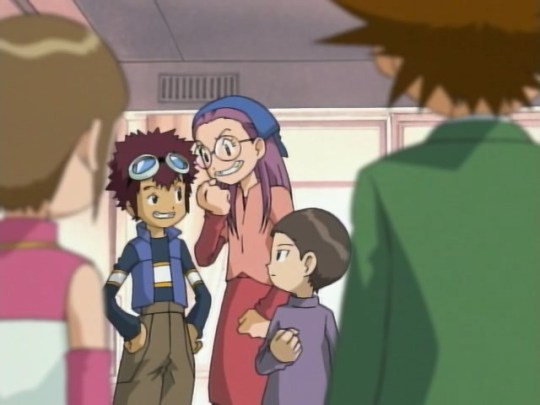
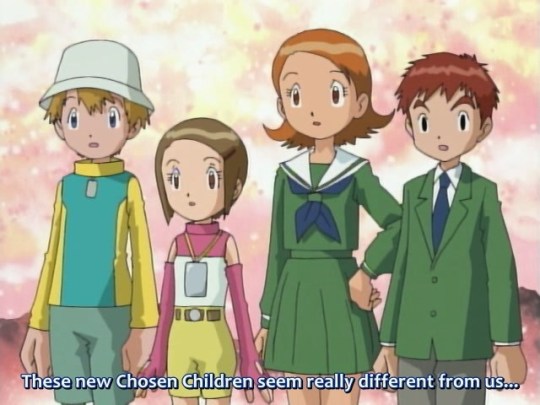
Having watched 02 in Japanese a few times and being very used to the core cast’s latter-half characterizations, rewatching the early episodes always strikes me really hard in the face with genuine shock at how shallow the kids -- especially Daisuke and Miyako -- start the series off as. It’s understandable in terms of the context of the series -- unlike the Adventure kids, who were thrown into a “survival, need to get home” situation off the bat and thus already understood the need to be wary, these kids started off having comparatively easy access to home at any time, and didn’t have a constant sense of danger and survival looming over their heads. It naturally took a lot of time for the gravity of the situation they were in to start really hitting them, and so even the relatively straight-laced Iori didn’t exactly take it all that seriously at the beginning.
Yet while it took them a significantly more delayed time to understand what they were dealing with and take it as seriously as they needed to...they started cultivating something else in the meantime.
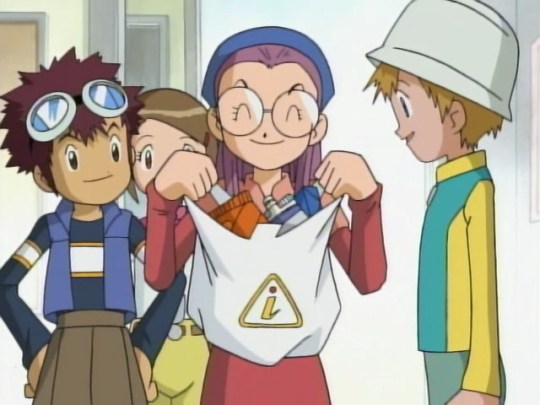
02′s first half is especially full of “random banter conversations” that seemingly involve nothing in particular, but, in fact, that’s actually part of the point. One thing I have always been quick to point out in regards to 02 is that it is rather unique among Digimon series in how it goes out of its way to portray its core cast as having become friends even in pure daily-life social friend terms, even if it had absolutely nothing to do with Digimon incidents -- these are kids who genuinely enjoy each other’s company even in the most mundane of situations. This was something that wasn’t the case for the original Adventure kids -- having been a group of kids thrown together by necessity, even though they most certainly kept in touch and trusted each other as fellow Chosen Children deeply, they started floating back into their own different social clusters after the events of 1999. Relationships are multifaceted, after all; you can still have a deep relationship and bond without necessarily being friends on a social level.
But already, off the bat, Miyako brings food for her new best friends, and it’s implied that she’s the main ringleader behind holding the picnic -- a picnic that started off having no intended relation to the Digital World territory war -- in episode 6. And, to be quite honest, can you really blame these kids? Even the Adventure kids wistfully entertained the idea of a long-term fun adventure through the Digital World in Adventure episode 54, wanting to enjoy its beauty and fun in a situation where they weren’t constantly running for their lives. Now that this luxury is actually available, why not take advantage of it -- and bond further with the others in the process? And for the rest of the year, these kids actively end up spending mundane conversations together and bonding to the point that, by the time we get to the end of 02, these kids have just genuinely bonded so much that they really come off as a cohesive, inseparable unit that would actively choose to spend time with each other if given the opportunity. In fact, even going through all of the TV Digimon series that exist as of this writing, I would say Appmon is the only one that really competes with 02 in portraying its core cast in this manner.
Again, remember: this is a series where characterization is dependent on how the kids treat others and interact with them, so you do actually have to pay close attention to these interactions and see how they change over the course of the series.
So once the episodes start coming in play, we actually learn a lot more about what happens when the characters start breaking away from their shallowness. For instance, episode 8, one of the first key episodes to understanding Daisuke’s character:
Daisuke: He'll be a great opponent. We didn't face off in the last tournament.
Takeru: If you had made it to the finals, you would have, right?
Daisuke: Don't remind me...
Hikari: Can you win?
Daisuke: It's not about winning or losing. Right now, all of the boys who play soccer in this country want to be like him. Just thinking about playing against him makes me excited!
For all Daisuke initially seems to be arrogant, he’s actually not that incapable of humility. Far from it, actually; he does have a genuine love for soccer and the spirit of the game, and, when completely and obviously unmatched, fully admits he has no chance and is set on enjoying the most he can out of it anyway. I feel like Daisuke’s surface-abrasive attitude really does throw off the fact that he’s a lot more genuinely humble than he’s given credit for. In the end, he’s satisfied enough with the accomplishment of pulling off one sliding tackle against Ken, and is able to enjoy that -- a foreshadowing of how the latter half relies so much on the fact that he’s capable of enjoying simple pleasures and being straightforward about them.

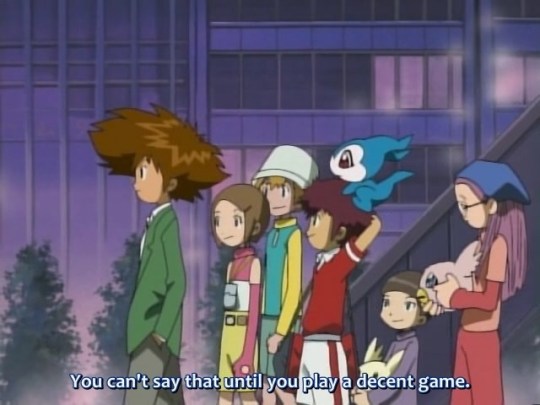
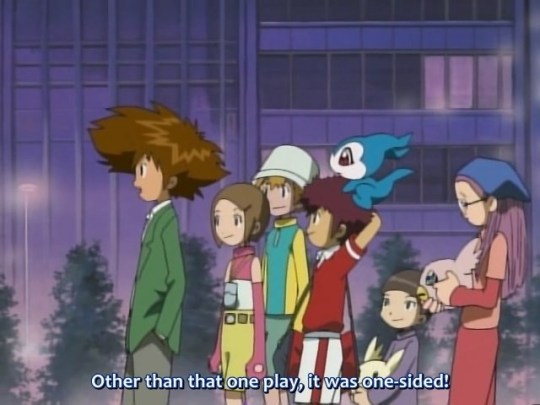
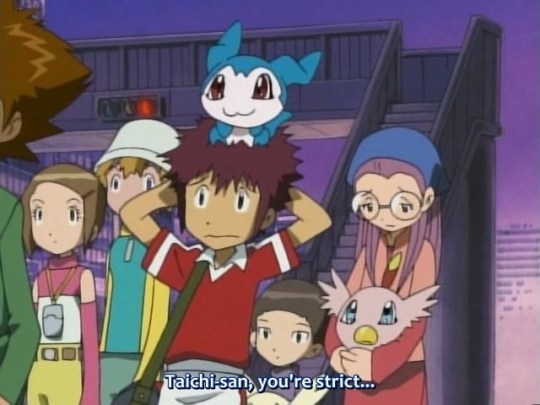
I find that this scene is really underappreciated, too (mainly because it gets lost in all of the other major things in this episode) -- while Daisuke jokes about his accomplishment, it only takes a single comment from his respected senior Taichi to shut him down.
There’s a huge reason I constantly emphasize that Daisuke respects his elders -- this part tends to get lost in translation a lot (especially the American English dub, which just smashed this aspect out of him wholesale, among other things) due to it being a bit reliant on Asian senior deference and cultural propriety, but Daisuke is respectful not only out of societal obligation but also because he genuinely respects his elders! The way he looks up to Taichi and chases after his approval is genuine, and even his interactions with the other Adventure kids have a major hint of him having genuine respect and deference to them. Daisuke is just a deferential person in general -- note that while his crush on Hikari tends to manifest when he’s at his most shallow, he’s actually the one putting Hikari on a pedestal (considering it his own responsibility to impress her), so he’s not actually as assertive as he tries to come off as. The first half of 02 arguably has him deflating more often than he actually stands his ground...and this is a trait of him that starts to actually change quite a bit over the course of the series.
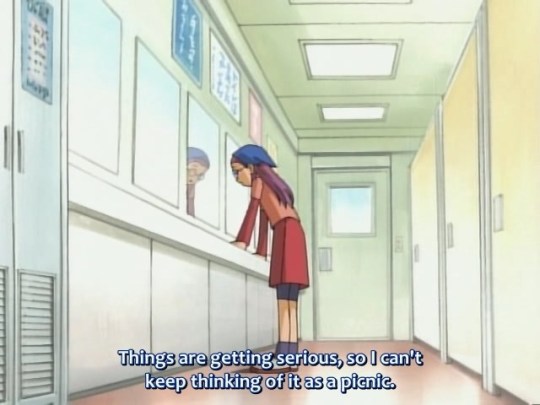
Miyako comes to terms with the fact that maybe she’d been taking this whole Digital World adventure thing too lightly in episode 10, indicating that she actually does have a good sense of priorities when they become increasingly clear! This is actually very important, because it fleshes her out as someone who’s emotionally sensitive -- too emotionally sensitive, to the point that “emotional sensitivity” is just as much of a driving point behind her later breakdown in episode 18, this time from taking her duties too seriously. Miyako is a very id-driven person, and so a lot of the early series is her struggling to find a proper balance on how to adjust her emotions in an increasingly escalating situation. Her heart is in the right place, she’s just not someone with an inherent sense of preparedness to deal with this kind of problem.
We get into the secondary Digimental arc, and there’s a noticeable consistent thread that all of them involve admission of personal faults. This is something that tends to throw people off at times -- wait, having bad traits about yourself is what awards you? -- but the point is that this isn’t like Adventure’s Crests, where things came from proof of exercising the virtue, but rather admitting that there are ways you need to improve, and showing a will to improve in that manner. In the end, people are not perfect human beings, and sometimes even understanding that you’re deficient is half the battle -- after all, the second half is all about a certain character named Ichijouji Ken coming to terms with some very, very serious personal problems.
In episode 11, Daisuke completely admits that he doesn’t feel he understands the concept of friendship the way Taichi and Yamato et al. see it, also latently admitting that he doesn’t see himself as worthy of the Digimental of Friendship. Beyond betraying a lot deeper issues within Daisuke that he seems to have actually had a background lacking in friends and sources of validation, he actually acts very self-effacing when admitting his issues to Taichi and Yamato, ultimately culminating in him calling himself pathetic. Or, in other words, he does want to be a better friend and to understand the concept better, and is harsh on himself for not doing better (which, of course, ultimately leads to how he eventually does gain better relations with the rest of the group and reaches out to Ken).
In episode 14, Miyako admits that she’s shallow and judgmental and tends to jump to conclusions based on first impressions. Recall that she’s comparing herself to Mimi in said relevant scene -- Mimi, whom she admires, and actually spends part of the episode trying to understand and empathize with the mentality of. This is not a statement of Miyako being proud of herself. Rather, this is Miyako being very straightforward about the fact that she needs to try harder to see through the essence of things and to see through to the emotional core of. Again, something she actually does start developing over the course of the series.
In episode 16, Iori gets his first major lesson on the limitations of being too stuck on principles in his attempt to be honest. Recall that Iori’s later character arc is very dependent on him realizing that his own view of the world is too black-and-white. It’s great if you could never tell a lie to anyone, ever, but in the end, that’s going to reach limitations of practicality -- after all, as Jou points out, what Iori did ended up not actually hurting Jou in comparison to the incredible amount of hurt it would have caused everyone by being too stubborn, and thus Iori would have failed to keep his responsibility to help the others because of one narrow-minded principle.
Hikari even gets in a bit during the infamous episode 13, where we learn that her “passive” attitude is biting her in the rear. In Adventure, Hikari’s passiveness and reticence had mostly been used as satellite development for Taichi (his insecurities as an older brother and his obligations to her), so this is actually the first time we get to see a proper perspective from Hikari’s side, and it turns out that his overprotectiveness has actually caused her to get dependent. But even though Taichi is the one the episode actually focuses on, the larger focus is more specifically on the fact that Hikari is too passive -- that she sees being taken by the Dark Ocean as an inevitable thing that’s just going to happen unless someone else steps in on her behalf. Takeru, of course, is having none of it.
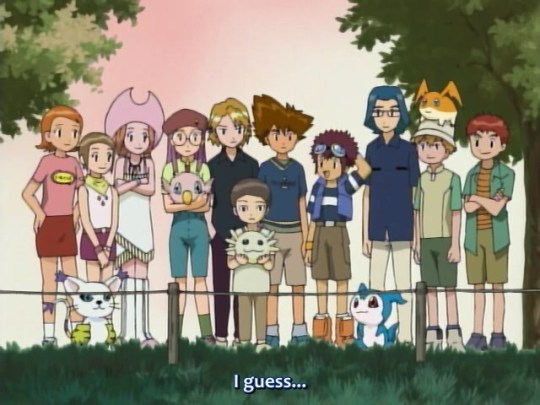
Once that’s out of the way, we go back to taking a look at the subtleties of everyone’s interactions. While everyone generally tends to focus on the second half of episode 17, it’s also pretty interesting to see how the 02 kids react to hearing about their seniors’ adventure in the first half -- remember that this is the first time the 02 kids are actually given any real depth about the degree of 1999′s events that’s not just random points of hearsay, and the way the new kids react to it indicates that they’re thoroughly floored. It’s later established that they didn’t even get the full story (it may not even be possible, given that the Adventure kids’ experiences may well have gone even further beyond what we got to see in 54 episodes), and yet the new kids are overwhelmed. 02 itself does not shy away from the fact that the younger kids really have no qualms about deferring to their seniors if need be, and treating them with utmost respect.
Another minor note, which I pointed out in my Daisuke meta earlier, is that the beginning of this episode is pretty much the last time Daisuke ever shows outright hostility towards Takeru for his relationship with Hikari -- it’s something you have to glean by squinting, but the implication is that the insecure and clingy Daisuke actually got to learn this episode that the two of them had a pre-established shared experience that he himself may not understand, and that it wasn’t just Takeru randomly swooping in and snatching away the closest thing he had to a friend for no good reason.
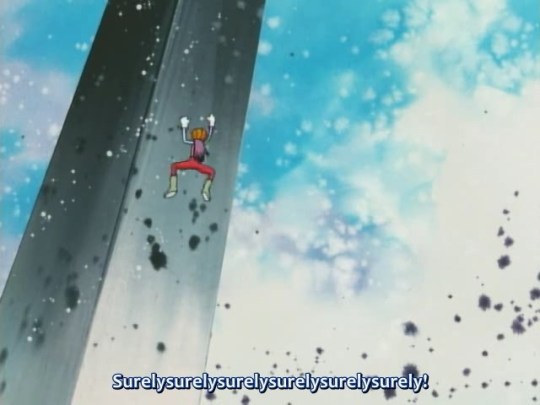
Once the Kaiser infiltration arc begins, episode 18 ends up being one of Miyako’s funniest episodes, but it’s a bit distressing that a lot of people in the fanbase often never let Miyako live this incident down, when in actuality this was explicitly not a good mental health day for her. (This is basically the equivalent of pinning Mimi as a conceited, self-centered jerk based on the fact she was one for a fashion in Adventure episode 25.) The beginning and ending of this episode establish that this is basically a result of Miyako...trying her hardest. She’s scared as hell, but she also learned in episode 10 that this is something she needs to take seriously, and the stress puts her into a mental breakdown. This is why she ends up having a heart-to-heart with Hawkmon at the end; her heart is in the right place, but she needs to find a way to channel her emotional sensitivity in a way that doesn’t make her into a complete mess.
And note that her own voice actress, Natsuki Rio, even pointed out that Hawkmon’s actions had enough of an influence on Miyako’s character that she had to play her differently thereafter.
At first I always played her with Maximum Excitement, and I kept thinking “someone, please, stop her,” but the more straight-laced Hawkmon did his best to pull her in and hold her by the reins (laughs). Thanks to him, Miyako became a lot more of a put-together person…thank goodness Hawkmon is her partner!
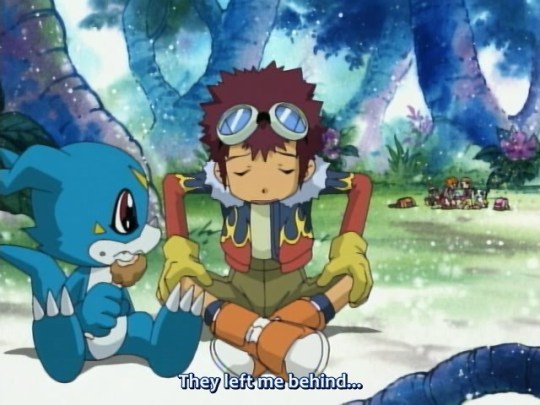
Episode 19 has two interesting things of note that I want to point out -- first of all, starting from the very beginning of the episode, everyone ditches Daisuke because they’re independently going in to infiltrate the Kaiser’s base. Note the complete lack of a plan here whatsoever -- everyone’s just going in on their own -- and the fact that everyone expects Daisuke to come up with what he wants to do on his own. For all it’s worth, even though Daisuke may have a designated protagonist aura to him, within the story itself...nobody actually sees him as a leader at this point in the series (and, to be fair, he’s never really tried to claim the position, either).
It’s similar to how Taichi was never recognized as a particular leader of the Adventure group until Adventure episode 28, but in regards to the full team dynamic, it’s actually inverse -- the Adventure kids were capable of making tactical plans together as early as episode 20, but fell apart emotionally in short order as soon as Taichi was gone, whereas here, the kids are fond enough of each other to hang out socially and support each other emotionally, but they take a while to get any real cohesiveness as a fighting group.
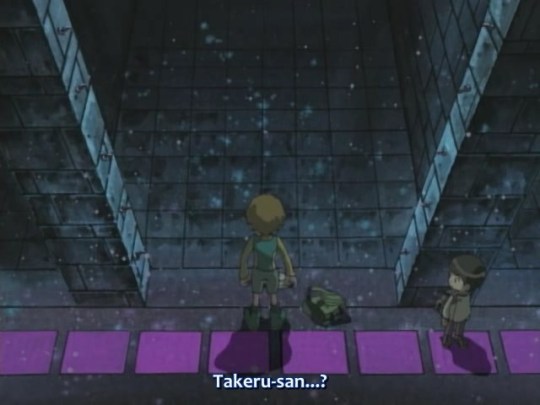
The other is that Iori personally witnesses Takeru’s sudden whiplash into his grudge against the darkness and the Kaiser, and it scares the hell out of him.
Takeru eventually laying a punch on the Kaiser is a pretty awesome moment (and, really, Ken kind of deserved it, so it’s hard to not cheer for him), but it’s also important to note that within the context of the series, this is not a good mental place for Takeru to be in. Iori, the person who should by all means sympathize with hatred of evil things at this point of the series, is still extremely unnerved by Takeru’s actions here, because he’d always seen Takeru as a mature person who’d always kept his composure, only to show a drastically different side of him that he hadn’t even shown a hint of before. That kind of “two-facedness” and emotional repression -- and this way of venting trauma in general -- cannot be good for Takeru at this point in time, and it’s also an important moment for Iori when he later admits during the two’s Jogress arc that he’s having a bit of a hard time understanding him.
And so episode 20 comes, and Chimeramon pretty much takes out the entire party, leading to this conversation.
Takeru: Let's escape.
Daisuke: Escape?
Takeru: We can't fight anymore. Our mission has failed. We'll retreat and wait for another chance.
Hikari: You're right. We have no other choice.
Iori: Understood.
Daisuke: No.
Miyako: Daisuke?
Daisuke: We can't just say "another chance" like that. If we leave now, they'll keep attacking anything in sight. We don't know if we'll be able to get into the fortress again. So this is our only chance!
Hikari: That's crazy...
Iori: Exactly!
Miyako: They're all back to their Baby forms...
Chibimon: Daisuke...
Daisuke: But...didn't you all see it? Destroying those towns...and all we could do was watch quietly. I don't want to see that ever again. I won't let them do whatever they want! So I'm going, even alone. I won't give up now. After getting this far, all I can do is go forward!
Why is this moment important? This is the first time Daisuke has actually stood a firm ground against anyone else in the party -- and not only that, with the entire party standing against him.
Recall that I mentioned earlier that, in spite of Daisuke’s abrasive attitude suggesting otherwise, he actually has a tendency to “deflate” pretty quickly when people tease or criticize him. He spends the first half of the series having a lot more bark than he actually has bite. Earlier in the series, if the entire party were to go against him, he’d be more likely to begrudgingly go along (while complaining) -- in fact, he actually did just that at the beginning of episode 7! But now that push has come to shove, Daisuke’s own sense of morals and bleeding heart have won out. (While his decision here is definitely a bit reckless, he does have a point; if they’d retreated, they might genuinely lose any future chances.) Even with the entire party telling him to pull back, he refuses to accept what they want him to do, and pushes forward.
This is where Daisuke first starts to really make strides towards what becomes his eventual major role in the group as “the one who pulls people forward”. It’s a moment after which the rest of the group themselves also start to treat him with more respect now that he’s proven he’s not just a doormat, and that when it comes to there being a real problem with real priorities, he does have the resolve and initiative to keep going.
Also, a very important point is that he immediately says he’ll go alone if he has to. He doesn’t begrudge the others for wanting to fall back, and has no condescension towards them; he just can’t stand the fact that he himself is being asked to sit it out.
So, you know. Episode 21 happens. Ichijouji Ken goes through some real trauma as Wormmon dies in his arms. And all Daisuke has to say is...
Daisuke: You should go home. There are people who are worried and waiting for you! Go home!
Remember when I pointed out that 02 takes a very unique perspective on Ken’s redemption arc, pointing out the futility of being too trapped in the idea of symbolic penance and focusing more on actively taking steps in the future to make up for and fix things? Here’s our first major sign of this, and Daisuke’s eventual approach to Ken -- Daisuke does not choose to scorn or lambast Ken for what he’s done, even though there are a lot of things Ken deserves to be harped on for, but rather instructs him to take the first active step towards fixing his mistakes, in this case fixing things with his family.
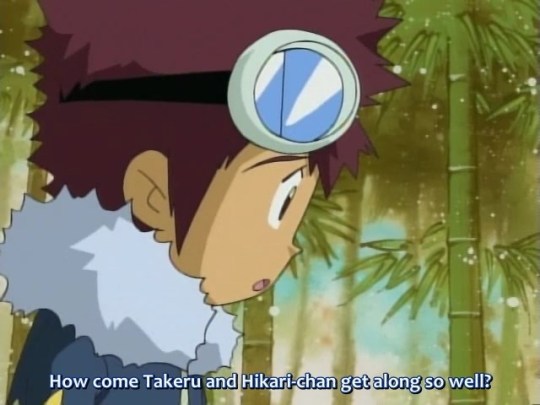
Episode 22 is Daisuke’s own “fanbase will never let him live this down” moment, but there’s still some interesting things to note here. Firstly, Daisuke’s “relapse” happening exactly when it seems like his duty to the Digital World is done and there’s nothing to do besides community service doesn’t seem coincidental, especially when this exact episode actually dedicates a full scene to Takeru, Hikari, and their partners going “...now what?” Secondly, as I touched on earlier, note that Daisuke’s never really seemed to have any resentment against Hikari for not responding to his affections -- in fact, he still considers it his own (and V-mon’s, by extension) duty to be the one to impress her. It’s a surprisingly refreshing take on the “shounen hero with a crush on a girl” trope, because in the end...Daisuke isn’t actually all that possessive of her, he just really wants validation from her, and respects her a lot.
More importantly, though -- note the way Daisuke handles this topic. He’s not actually mad at or resentful of Takeru anymore. In fact, he’s mulling on the topic and wondering what he could do to be on that level. Yup, even when Daisuke’s being shallow and jealous, he’s still learned to handle this issue ever so slightly more maturely than he would have at the beginning of the series.
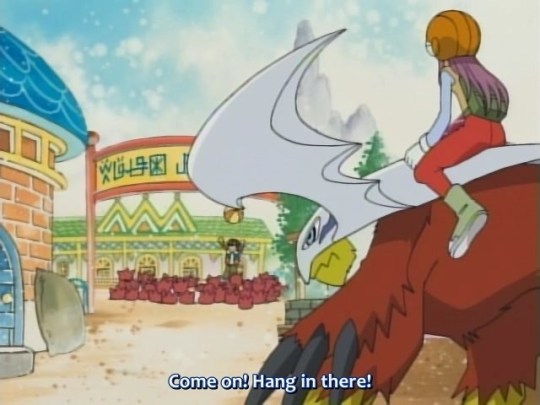
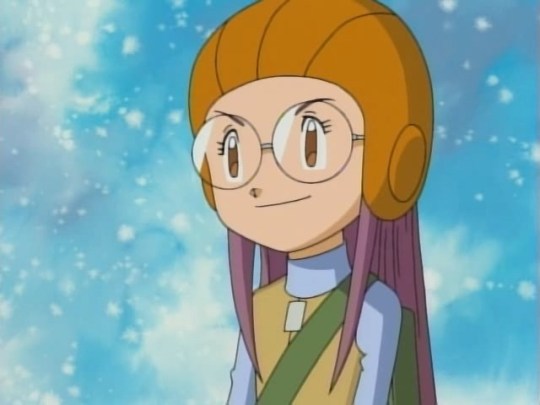
This is also important because only one episode later, once Daisuke becomes disappointed again at Takeru and Hikari walking off on their own, Miyako intervenes -- not only so that Takeru and Hikari can have their space, but also so that Daisuke can have some genuine fun and something to do. This is a very blink-and-you’ll-miss-it moment in episode 24, but it makes it very clear that Miyako was looking out for Daisuke’s welfare, too, and I think it’s very important in light of the events of the prior episode. Miyako, who had always been fumbling on what to do with her emotions, is starting to properly channel them into managing the dynamic between the team and checking in on how everyone’s doing, and that starts to guide her actions and relationships for the rest of the series.
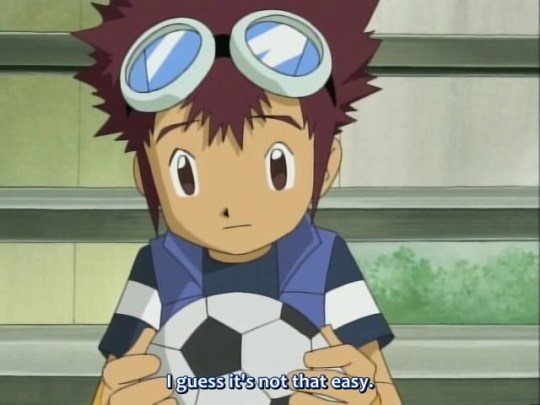
The next episode (25) is where we kick off not only the Jogress arc, but also the arc where we start going into everyone’s attitude towards Ichijouji Ken. This is important not only because Ken happens to be the effective central figure of 02′s story, but also because -- well, remember, 02 is fundamentally founded on the concept of relationships, so it’s only natural that the other kids’ relationship with the “team newcomer” will be a key aspect of the second half, and in relation to their own characters.
Remember how I said that Daisuke’s first-half character involved him being extremely deferential and often deflating whenever he was criticized or someone stood against him? At the time of episode 25, once again, pretty much the entire team is standing against him -- he’s the only one who’s this level of open-minded about getting Ken into the group, and everyone else is showing differing levels of opposition. But while Daisuke doesn’t begrudge the others for thinking this way, he also doesn’t back down, either, and reaches out to Ken on his own because he still really believes in what he’s doing. Now that he’s settled into what it means to be a Chosen Child, he’s started to gain a proper idea of what he wants to do, and what he feels needs to be done.
So, let’s recap everyone’s stances on Ichijouji Ken at the time of this episode!
Daisuke: Forward-thinking and optimistic; willing to believe that Ken should be given the chance to make up for his mistakes and that they should put everything behind him, even to the extent of believing that there’s probably a good reason for the more suspicious aspects about him (prior to the events of episode 25, it was unclear whether Ken was being a bit too callous about killing Digimon). Also the most actively aggressive in reaching out to Ken and trying to get him to join them.
Miyako: Forward-thinking; she openly states at the beginning of the episode that she thinks Ken’s learned his lesson, she’s just worried about whether he’s going to keep doing questionable things in the future (killing Digimon). Once it’s on the table that he’s not just doing this callously, she immediately is on board with him (to the point of even being the first in the group to use given name basis with him), but her stance on what to do with him is more on the edge of “give him space and wait for him to come on his own terms” (she ends the episode saying she’ll be waiting for him to come).
Takeru: States in the episode that he does believe that Ken’s changed, but doesn’t really know what he’s thinking (i.e. too inscrutable to really be sure about). The later episode 35 implies that Takeru was inclined to be a bit more sympathetic than you’d think otherwise, because he understands the trauma of losing a Digimon partner.
Hikari: Wants to wait a little longer and see how things play out. (Remember that Hikari has a known, consistent thread of taking a very passive approach towards things.)
Iori: Absolutely against it on sheer principle.
It should be noted that none of these stances are wrong. Iori sometimes gets a lot of flak for being the one with the most infamously cold stance towards Ken, but when you really think about it, Daisuke and Miyako are very lucky that their hunch about Ken was right and that he actually did happen to be a very kind boy who had a little too much trauma and some supernatural influence. The fact that Ken is a very emotionally withdrawn person for the rest of the series meant that the two of them ended up breaking through to him the most, but there’s nothing wrong with Takeru, Hikari, and Iori’s skepticism; Ken did some pretty shockingly horrible things in front of their eyes for the first half, and it’s entirely within their rights to determine how forgiving they want to be with him.
In any case, we get to episode 26 (the first Jogress), and most of that episode goes without saying, but I do want to emphasize Daisuke’s lines right before it happens.
Daisuke: If you die now, you won't be able to accomplish anything...I don't want that!
Ken: I don't want that...There are still many things I must do.
Daisuke urges Ken not to go for the “suicidal penance” route not only because it sucks, but also because, as symbolic as it may be, it’s also counterproductive to the whole point of doing penance to begin with. If Ken really wants to make up for his mistakes, he’s only going to be able to do that if he’s actually alive to do it! There’s only so much you can do by drowning in self-pity by going “because I did this, because I did that” instead of actually taking responsibility for your actions.
02 itself is deliberately ambiguous on how much Ken’s transformation into the Kaiser was Ken’s own conscious will and how much of it was Dark Seed-induced supernatural influence, but one thing it’s consistent about is that it doesn’t really matter. Regardless of what the cause was, Ken did what he did, and it’s his responsibility to make up for it, and the only way to actually do that is to keep moving forward. The fact that Daisuke is so able to viscerally and directly address what Ken needs the most right now is what fuels their first Jogress, and why Daisuke becomes Ken’s closest friend through the rest of the series.
People have pointed out that 02 has a lot of moments of physical hits, but, notably, other than Takeru punching the Kaiser in episode 19 (which he really deserved, honestly), all of these hits are done with the express intent of bringing the other person out of a very, very deep mental abyss (Yamato punching Taichi in episode 10, Daisuke slapping Ken in 26, Miyako slapping Ken in 30, and Miyako and Hikari’s mutual slaps in 31), because they were in a state where words would no longer reach them otherwise. These are all circumstances of the kind where the person on the receiving end understands that they really needed a drastic wake-up call because of how deeply they’d fallen (and these aren’t some average mental abyss problems these kids are getting put through, either). It’s actually hard to imagine any of the 02 group getting in the kind of genuinely angry and vicious fistfights Taichi and Yamato would in Adventure, because of how close they are (the closest being Daisuke and Takeru grappling in episode 11, but it never got near that level) -- in fact, these kinds of things are done with the implication that they’re doing it because they trust the other person to not hold it against them (and in fact, the fact Yamato does this with Taichi in this way is intended to be read as a sign of how much better they’ve come to understand each other).

So, moving on with the series! The Giga House incident in episodes 28-29 is the first time the group works together in an organized effort, which is notable not only because it’s their first time coordinating with Ken, but also because it’s their first time properly coordinating at all. Remember when I mentioned that, back in episode 19, as much as the kids were pretty fond of each other and were great friends, they still hadn’t figured out how to actually fight as a team? Here we are, with them actually having started to figure that process out.
We then get to episode 30, where there’s actually quite a lot of interesting things to unpack.
Miyako: What's wrong with you?
Daisuke: E-Eh? Mi-Miyako-san?
Miyako: It feels weird when you add the "-san".
Daisuke: Shut up! Man, you're all the same!
Miyako and Daisuke’s relationship is often misconstrued considering that they’re the two most chaotic in the group (their temperaments are very similar at times, which causes them a lot of friction), but I also think this blink-and-you’ll-miss it moment is pretty much their actual relationship in a nutshell. They fight a lot, and they’re ostensibly vitriolic, but they’re actually two of the most like-minded in the group -- they banter because they’re comfortable with each other. Recall that I mentioned that Daisuke is normally respectful with his elders, yet he’s the only person in the group who won’t use the -san honorific on Miyako (even though she’s the oldest)...but the one time he gets flustered and uses it on her, she tells him that it’s weird and he needs to cut that out. Or, in other words, “it’s not like you to be weirdly respectful of me like that, we shouldn’t have that kind of distance between us, stop it.”
(It’s also pretty notable that Miyako has never seriously used -kun or any other honorific on Daisuke, even right after meeting him -- the only other person she dropped honorifics on was Iori, whom she’d known prior to the start of the series, but she seems to have deemed Daisuke enough of a fellow disaster child that he merited dropping it.)
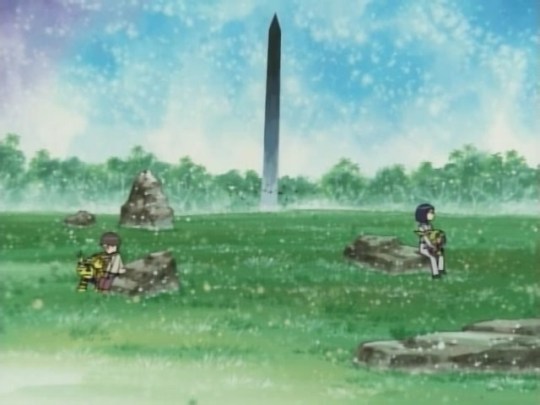
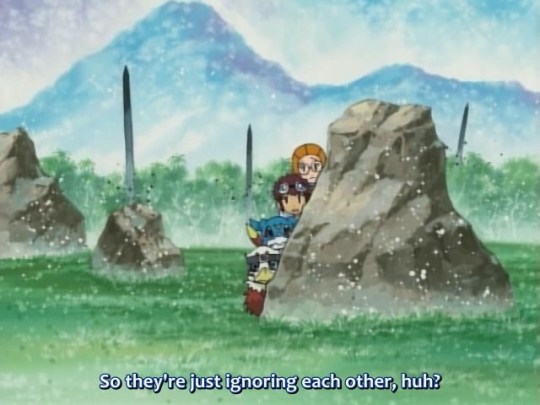
This is especially because, right after that, she recruits Daisuke into her plan to get Ken and Iori to get along -- in the end, when things really get serious, the two are incredibly like-minded (look at how in-sync they are when they scheme together).
30 is actually a surprisingly Miyako-centric episode, despite not ostensibly being one. For one, it says a lot that right now, her biggest priority is to get Ken and Iori to get along -- something that has absolutely nothing to do with herself. In episode 14, Miyako freely admitted that she had a tendency to jump to conclusions about people, and that she was shallow about aesthetics, but this is a very different Miyako from the one who harassed Daisuke for Ken’s autograph in episode 8, or immediately became distrusting of Digitamamon in episode 14. Instead, she’s simply just genuinely invested in seeing people she considers friends get along, and in a selfless manner -- one that has nothing to do with herself. She just really, really cares, a lot.
After all of the first-half hubbub of Miyako really having no idea of what to do with her emotions, the second half has her start channeling that energy into what’s always been one of her biggest strengths: checking on, connecting with, and caring about her friends. Daisuke may be an aggressive forward-thinker who can push everyone in the right direction, but unlike his predecessor Taichi, he doesn’t actually have particular charisma or leadership skills that can necessarily hold everyone together. In the absence of that ability, Miyako fills in for him, checking on the moods and feelings on everyone in the team and making sure everyone’s doing well. And that’s why she loses her temper and slaps Ken late in the episode -- because, really, she’s reached her limit on her “give him space” philosophy when he’s abusing it to be standoffish in a crisis situation, and, on top of that, she really, really did have a huge emotional investment in him.
Moving onto more Miyako in episode 31, her Jogress episode with Hikari, we get to see a little bit of the old emotionally compromised Miyako again, but -- much like the second Digimentals arc -- it involves the two of them acknowledging that both of them are not going about things the best way, and that there are things they can learn from the other.
Hikari: Miyako-san, you're a handful sometimes.
Miyako: I knew that's what you thought of me...
Hikari: But...I've always envied that.
Miyako: Huh?
Hikari: Because I can't be honest and say I'm scared or scream like you.
Miyako’s tendency to lose control emotionally results in her being insensitive much of the time, which she calls herself out on multiple times during the episode, and she can’t always be as “kind” as Hikari is -- but, on the flip side, her antics are something that can be a “light” (pun not intended) towards those who are falling in a bad mental state or into the darkness, and Hikari even acknowledges this when one of her trains of thought makes her break out into laughter. Miyako ultimately manages to get through to Hikari this way at the end of the episode, which results in a Jogress and mutual growth for both of them -- Miyako puts more thought into how to approach others (it’s pointed out at the end that she’s still thinking about understanding Ken and Hikari better), and Hikari gains more resolve and determination to fight against things instead of passively accepting her fate (she tells Takeru very directly at the end "I’m fine now. I’ll never go there again.”).
Iori and Takeru's Jogress is a little more complicated to the point where it spans multiple episodes, but a lot of it ends up having to do with the fact that the events of the BlackWarGreymon arc start really putting Iori's black-and-white principles into conflict -- it's wrong to kill something that's been proven to be alive, but it's also wrong to be evil. Putting a huge nail in that is that there's a stake in him forming a relationship with Takeru, but he doesn't really understand Takeru either -- the "two-facedness" he witnessed back in episode 19 scares even him, and he's so intimidated by Takeru that, in episode 35, he goes to approach Yamato about Takeru's past instead of asking the person directly. Takeru, hearing about this, complains that he could have just asked directly, but admits he understands why Iori did so.
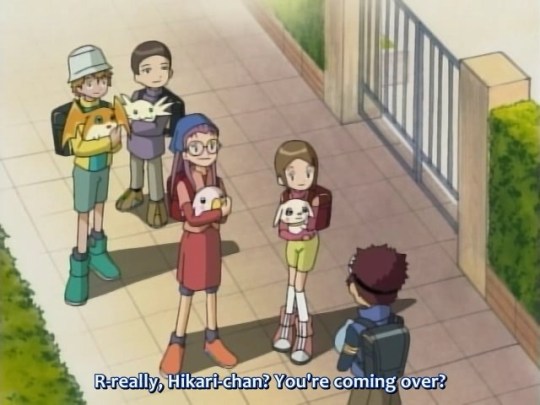
By the way, I should point out that episode 35 is the last time within the TV series that Daisuke is portrayed as having a particular interest in Hikari, and it’s just in terms of being slightly more excited that Hikari is joining his meeting. At this point, there are actual important things happening in the Digital World, and he needs to take care of Ken, too, and so...in the end, once again, Daisuke proves that he’s actually capable of putting aside those kinds of more shallow things when he really needs to.
On top of that, this is when the kids start actively working with Ken in the real world (and, if post-02 materials are any indication, continue to hang out with him even for social outings). The choice to have Ken live in Tamachi instead of Odaiba facilitated his isolation from the group during the Kaiser arc, and during around the third quarter they were all grouping up in the Digital World anyway, but the fourth quarter actually has the kids make an attempt to include Ken in their real-world outings despite the distance. Tamachi is not temporally far from Odaiba (approximately half an hour by train), but it’s a bit of a nuisance to get to, requiring crossing a bridge to/from the Tokyo mainland and paying extra for the Yurikamome. But at this point, he’s an important enough friend to them -- and them important enough friends to him -- that they’ll make it work.
At the end of episode 35, Iori finally decides -- to the point of recklessness, something that would have been previously very uncharacteristic of him -- to try and appeal directly to BlackWarGreymon to get him to stop destroying the Holy Stones so that they won’t have to fight. It’s emblematic of Iori’s heart being genuinely torn, because he’s having such a difficult time rationalizing all of these conflicting feelings. This comes to a head in episode 36, when Iori loses his temper at the rest of the group for “playing around”, but Armadimon snaps him back to reality to remind him that they’re tired and hungry, and this can’t be neglected. Iori himself ultimately becomes the one to proactively suggest that they take time to sit down and eat, indicating that -- little by little -- he’s starting to shift his thinking a bit, after being so incredibly stubborn for much of the series.
This is what leads to Iori and Takeru’s Jogress at the end of the episode, now that Iori is flexible enough in thinking to understand the emotional id behind Takeru’s mentality. And likewise, Takeru’s started to loosen up by 36, too --
Takeru: Sure, darkness is frightening, and we would feel at ease if we could get rid of it completely, but I'm sure that's impossible.
Ken: Impossible?
Takeru: Where there's light, there's always darkness.
Hikari: The brighter the light, the darker the shadow, right?
Takeru: Yes. That's why I think it's important not to lose sight of the light inside you, no matter how dark it is.
The thing about Takeru is that while he deceptively seemed more open and playful than Hikari for most of the series, he was actually bottling up a lot of emotions in a way not entirely different from the way she did. (Note how, despite how tied at the hip the two constantly are, they almost never actually talk about their thoughts on each other; it feels like a relationship where they implicitly trust each other but are practically reliant on that implicit trust to maintain that close of a friendship at all.) And he’s been keeping those emotions bottled up until they exploded in less-than-healthy ways, initially distancing himself from Iori. But being a lot more open about his thoughts on the matter allowed them to connect better, and eventually Takeru came to embrace a somewhat more reasonable stance on the matter after observing Iori.
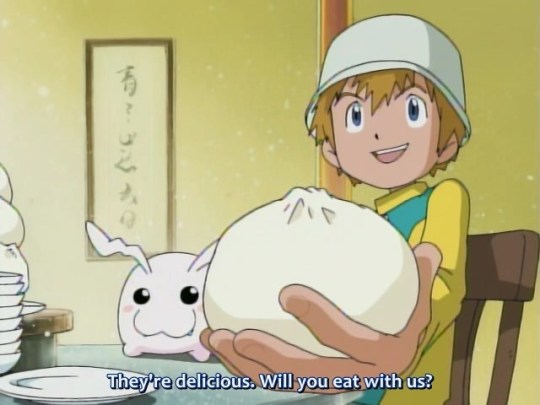
It also doesn’t seem like coincidence that this is the episode that ends with Takeru’s first major act of goodwill towards Ken.
This leads into episode 38, the Christmas episode. Fun things to note!
The episode opens with Daisuke and the other younger kids giving a “Christmas present” to their seniors in the form of letting them reunite with their partners. Remember how I said that the 02 kids always admired their seniors and looked up to them? Even this late in the series, the series does not shy away from the fact you’re supposed to see the 02 kids as their deferential juniors.
The Christmas party is, of course, notably, the first major moment of reconciliation between Iori and Ken, with Iori having gone through major harsh lessons about morality in the last few episodes, and Ken opening up more to the rest of the group. Said party is also yet another notable example of how much of a priority it is for the 02 kids to be “social life friends” and not just friends working as a Digimon incident team -- after all, having genuinely emotionally present friends is what Ken needs most in his life right now, considering that the party is treated as the first time he’s been truly happy in a long while.
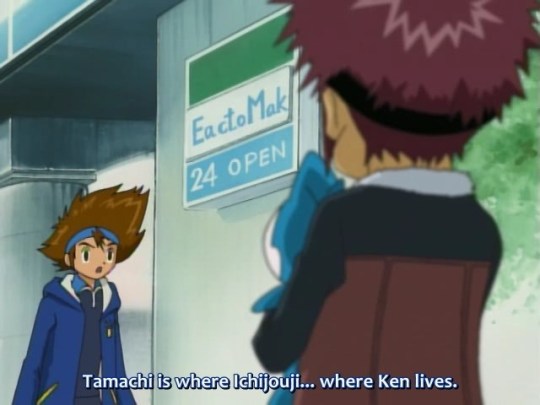
This is followed by episode 39, which is notable as the time when Daisuke finally commits to switching to given-name basis for Ken, and actually opens the episode standing against Taichi -- because he's so worried about Ken that he needs to go join him. This is something that's lost a bit in translation, but although Daisuke stands down against Taichi, he's not rude nor does he overstep his boundaries with his respected senior (he even opens his statement in polite-form Japanese) -- he's just saying, firmly and politely, "I'm sorry, but I can't go, I have to go help my friend." It’s a notable moment because while Daisuke has been becoming increasingly assertive and aware of what he really wants to do, this is the first time we’re actually seeing him refuse to defer to the very senior he’d spent so much of the series idolizing and looking up to.
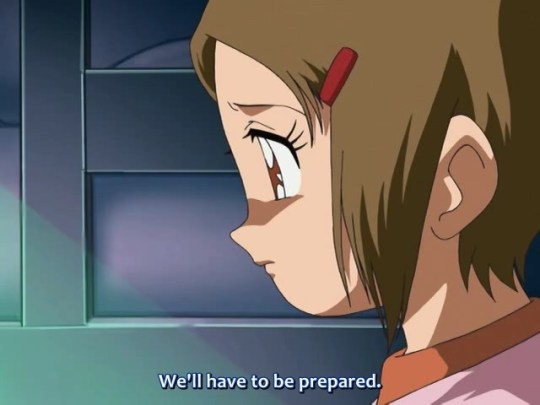
We get to episodes 43-45 (the Demon mini-arc), which is also the culmination of the 02 kids having to face the limits of pacifism. This tends to throw off people who are coming in from Adventure, since the Adventure kids ended up killing Digimon with a lot more ease in the original series, but it’s also important to make note of the fact that the episode itself deliberately portrays a gap in mentality between the Adventure and the 02 kids -- with Hikari torn between the two. It also creates an interesting subversion of expectations when Hikari, the one you’d expect to be more on the pacifist side, is the one who’s already accepted that it may be inevitable, whereas Miyako, the more aggressive and belligerent one, is the one staunchly against it.
The reason for this “paradox” comes out of a single line from Hikari in episode 44:
Hikari: You’re the one who saved him, Miyako-san.
The Adventure kids never liked killing. They were never enthusiastic about it -- it was just that they were almost immediately put in a situation where the entire fate of the multiverse was at stake thanks to some unambiguously evil Digimon who wanted nothing but wanton destruction. Even then, it was pretty clear that they never enjoyed it -- Takeru professed a desire to avoid fighting in Adventure episode 12, and the pacifist Mimi went through a breakdown in Adventure episodes 45-50 trying to avoid casualties. But one of the most important lessons Mimi learned at the time was that pacifism has its limits -- there’s no point if it ends up in more deaths than it saves, because at that point you’re adhering to moralistic principles more than you’re actually saving lives.
The fact that the Adventure kids and the 02 kids have a “different mentality” isn’t just happenstance, but outright embraced. Daisuke, Miyako, and Iori never had to actually deal with a conscious Digimon that was unambiguously evil for most of the series, and Archnemon revealing that her motives were pretty much nothing but wanton destruction in episode 29 was the first major warning signal to Iori that his pacifism might have limits. And during this Demon mini-arc, it’s not like these Digimon are threatening multiverse destruction or anything -- it really does seem like a constant “glimmer of hope” that maybe, just maybe, they can save people non-lethally. Alas, they can’t.
Daisuke, being someone who’s inherently practical-minded, starts entertaining the idea that push may come to shove as early as episode 25, and finally makes his first statement about practical limits in episode 43. But the more emotionally caught-up Miyako and Iori end up taking another episode to swallow it, and they don’t take it well. Most of the attention in 44 is given to Miyako, and it reconfirms that, despite her aggressive exterior, she’s emotionally sensitive and empathetic -- and while killing LadyDevimon is framed as truly the only thing that could have been done in that situation, Miyako is not faulted for being emotionally compromised, nor is Iori likewise when he faces a similar situation with Takeru and is forced to confront the people whose lives were at stake.
Episode 45, when Ken opens the gate to the Dark Ocean, doesn’t really have much to add on top of what’s already there, but this is basically “the point of no return” when everyone confirms their own emotional investment in Ken and understanding that he’s not just reformed, he’s genuinely struggling under the pain of what’s been happening -- and this is before they find out about the truth behind the Dark Seeds, and that Ken’s transformation into the Kaiser may have been supernaturally influenced, too.
It’s also interesting to see the different ways each kid reacts to Ken as they support him:
Hikari, the most outwardly compassionate, goes to support him the second she notices him in physical pain; Takeru notices that it might work, realizes Ken needs the support, and joins.
Iori and Miyako reflect on how Ken’s putting all of his efforts in, and lambast themselves before joining. Interestingly, given the circumstances behind what’s happened up until now, Iori and Miyako criticizing themselves take a different meaning -- Iori, who’d been scornful of Ken until recently, seems to be regretting that he distrusted him when Ken had been trying so hard, while Miyako, who had been open to him since episode 25, seems to be upset that she’s sitting there and not doing enough when he’s in all of this pain.
And Daisuke, of course, the most “forward-thinking” of them all, gives Ken a speech about what he’s done so far and reminds him that he’s already done more than enough for “atonement” -- which is, of course, what directly reaches Ken the most.
And when we get to episode 46, and the kids, now knowing about the Dark Seeds, hold a roundtable (and emotional support group) to discuss what to do about the Dark Seeds, Daisuke’s the one with the most spirit and energy about it, but...
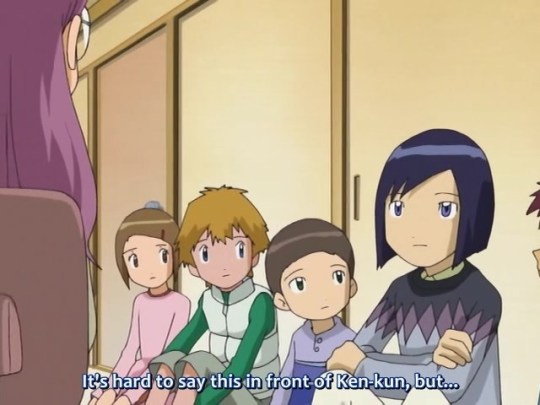
...the one actually leading the roundtable? Miyako.
Miyako: Sorry, that's all I can think of.
Ken: Please don't worry about me.
Miyako: (nods)
It’s subtle, but the scene in question does actually make a deliberate move in indicating that Miyako’s continuing to channel her emotional sensitivity and desire to go out of her way to help Ken -- of course, they all know how traumatic this is for him, but she’s the one who’s actively calling attention to how he must feel about it first and foremost.
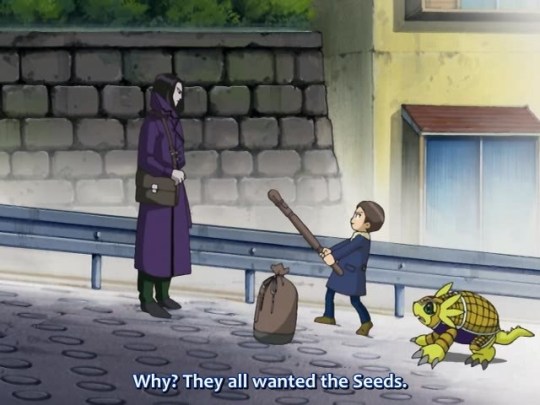
Episodes 47 and after end up becoming yet another major wake-up call for Iori (seriously, I do not understand why people claim he had no character arc when this wasn’t even remotely subtle) when he learns that Oikawa, whom he’d pinned as “evil”, has a deep relationship with the father he’d grown up idolizing so much, and it completely flips his world around -- even though he had started to get a bit more open-minded, he’s still trying to rationalize what should have been, in his mind, two diametrically opposite things. It fuels his confusion and desperate desire to understand more, not just about Oikawa, but about everything he’d thought about morality and why people turn to evil.
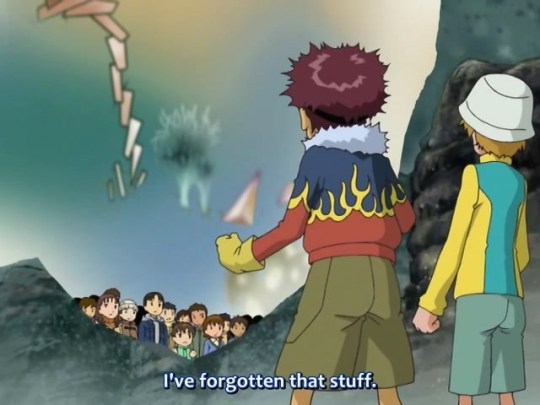
So we get to the final arc of the series, and it involves a confrontation with BelialVamdemon -- but said finale is heavily dependent on talking to the Dark Seed children and inspiring hope back into them. This results in a conversation where everyone talks about their career dreams, and Daisuke admits that he wants to be...a ramen chef, which completely blindsides even his friends.
What’s with this arc?, you might think. And moreover, why is Daisuke ending the series still kind of an idiot? Even Miyako still seems to be a bit of a mess and chaotic. Weren’t they supposed to be growing into dignified heroes, like Taichi and his friends were last series?
Well, here’s the thing -- the fact that the 02 kids end the series comparatively “undignified” is actually very inherent to the core theme of 02 itself. There were more than enough episodes that established that said kids are heroic in their own way -- caring about others, fighting on others’ behalf, and learning important lessons about what’s important to fight about. That doesn’t mean they don’t get the right to continue being disaster children while they’re at it.
Why?
Let’s look at a few official statements behind the creation and intent behind 02 as a series. From producer Seki Hiromi, from the Digimon Animation Chronicle:
That came from an idea I had while reading a newspaper article. I read a story about a nine-year-old boy going to Columbia University, and I thought, “This boy is going to college because he’s considered a genius, and everyone around him will be in their twenties, and he won’t get to have any friends his age. What kind of life would this boy end up having?”
Or some very interesting statements from head writer Yoshimura Genki from the 02 Blu-ray box:
When I was writing Ken Ichijouji, the main idea for him I used as a basis was the conflict between “the self that has to be a well-behaved child when adults are watching” and “being able to be oneself”, and the pain that came from it as a result.
So for instance, in the same way as the Pinnocchio fairytale, or the short story A.I. that was adapted into a movie, or many other works, there are probably universal worries that all children feel as they grow, but also, there were ongoing unimaginable, atrocious incidents happening with children at the time, and perhaps it was those social conditions that gave me a hint on what to do. I think I had some thoughts that I wanted to convey to the children who were living through that time.
I was given the opportunity to put those kinds of feelings, as much as I liked, into episode 23, and I am truly grateful to all of the staff, including the director.
...
Also, this is about Daisuke’s character, but I believe I paid particular attention to making him “a child who could be himself”.
He has no special talents, and although he’s clumsy and scatterbrained, I wanted him to be someone whose strength was in his straightforwardness, and wrote him that way.
Lying underneath the entirety of 02 itself is a theme about “children who are not allowed to be children”. Or, in other words, the pressure placed on children to be “talented” and “dignified” and “well-behaved”, often imposed on them by well-meaning parents who are unfortunately taking the opportunity to stroke their own ego, robbing them of the happiness and mental freedoms they should have as kids.
Ichijouji Osamu and Ken, who were placed under the pressure to be “genius children” and cracked under the pressure to please their parents. Oikawa Yukio, who was cut off from the Digital World in childhood by a well-meaning Hida Chikara, worried about his son getting into “foolish” talk. The Dark Seed children, who also fell victim to similar pressures that Ken did, and lost hope for life unless they could force themselves into that mold.
Takeru: If you want the Digimon to exist, if you believe in that, they will. Just like our feelings...Just like every child having the power to make their dreams come true.
Keiko: That's just childish.
Daisuke: You all have dreams for the future, don't you?
Noriko: Dreams for the future?
Takashi: I've forgotten that stuff.
Daisuke: No way! You must have one!
Takeru: It's nothing to be ashamed of.
Takashi: Then, what's your dream?
Daisuke: Mine? Mine's a ramen shop. I love ramen! I'll become the world's best ramen maker!
Ken: I had no idea...
Noriko: Well...actually, I wanted to be a kindergarten teacher.
Hikari: Me too.
Daisuke: What about you guys?
Takashi: A baseball player!
Keiko: I really want to be a pastry chef.
Hiroshi: When I said I wanted to be a manga artist, everyone laughed, so I gave up...
Takashi: We all had aspirations, and at some point we thought that wasn't allowed...But we were wrong, right?
Daisuke: Let people say whatever they want!
Noriko: You're right, we should be free to dream.
Miyako: Not just dreaming. If you work hard, your dreams will surely come true!
Notice something about all of these careers mentioned? They’re all the kind of “overly childish” “wild dream” “undignified” “too simple” kinds of dreams that an average parent might be uncomfortably quick to shoot down because that’s “not good enough”. These are the kids who willingly accepted the Dark Seeds; they, much like Ken, probably grew up under parents who prioritized school performance and other “societally dignified” things that ended up eating away at their happiness.
02 has a lot of different themes, but the one that lies in its undercurrent from start to finish is “so why does a child have to be this way? As long as they still understand what’s important, do they have to be dignified people? Why can’t they just be free to have dreams and be themselves?” And Daisuke and his friends are there specifically to stand up against this mentality, and to remind Ken and the other victims of it that it doesn’t have to be this way -- that it’s okay to be your true self, and be a child, and not succumb to all of those arbitrary, shallow standards people put on you. Even if that means you’re still a bit of a chaotic disaster at the tender age of eleven.
Digimon, in the Adventure and 02 universe, have always been treated like a part of the self (they were literally conceived as a physical manifestation of the soul), but in 02 they gain an extra meaning of representing “the inner, deepest part of yourself that represents your wildest ‘childish’ dreams”. The symbolism of Ken spending the first half of the series trying to reject Wormmon for being “weak” -- in other words, rejecting his own kind-hearted self for not being the kind of “strong” entity he was pressured and groomed into being -- is not lost, nor that of the Dark Seed children gaining partners when they reconnect with their dreams and wishes, nor Oikawa finally, finally meeting his partner when he comes into contact with the past he’d really lost (and especially not the fact that his attempt to reclaim shallow reminders of said childhood involved trying to make his own Digimon).
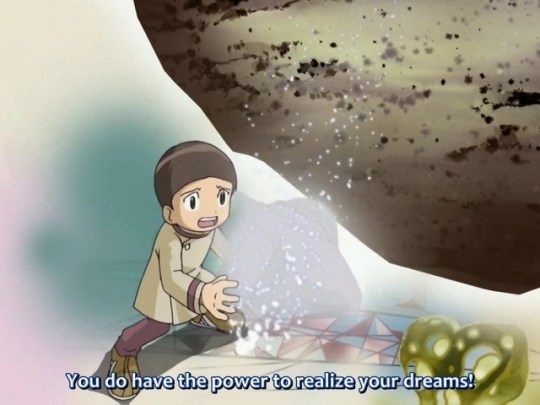
And notably, the series’s finale (prior to the epilogue) ends not on Daisuke but on Iori, escorting Oikawa to the Digital World despite how completely impossible it would have been for early-series Iori to even entertain the idea, finally coming to truly understand what happened with him and being most personally impacted by his death.
But in any case, where are we with the characters? We’re here to talk about how they’ve grown and developed over the course of the series. Let’s recap:
Daisuke: Started off the series as an abrasive kid with more bark than actual bite, constantly deferring to others and easily deflating, relying on shallow sources of validation like wanting attention from Hikari; gradually gained an ability to identify what was important and put his foot down for it, embraced his forward-thinkingness to reach out to a heavily troubled child as a friend, and ended up surrounded by a friend group that loves and respects him.
Miyako: Started off the series as a shallow, flighty girl with poor control over her emotions and difficulty in appreciating the gravity of things; came to channel her emotional range into empathy for others and compassion, bringing other people together and taking care of them.
Iori: Started off the series as a straight-laced but too principled child who stuck to “rules of what’s right” not only in morality but also in way of acting; started to appreciate the emotional nuances and heart behind why people do what they do and how it’s possible to be more flexible in “doing good”.
Ken: Well, his character arc is pretty obvious, but -- again, while his arc of learning to forgive himself is well-known, less often pointed out is that it centers very heavily on not only having penance but also not being too hung up on the past, and the futility of drowning in self-pity and regret instead of choosing to take responsibility and act more productively going forward.
Takeru: Started off the series as a seemingly mature but deceptively inscrutable character whose duality made him hard to approach; eventually opened up with the help of others and showed a capacity for being more flexible with his personal grudges.
Hikari: Started off the series emotionally repressive and passive to the point of self-destruction; eventually embraced connections with her other friends and became more active in taking a stand for herself.
Hey, not bad!
And, again, this is not a series you should be reading in terms of “self-awareness” in the same way Adventure was, but in the sense of their “relationships” and how they interact with others. By being less abrasive and more assertive, Daisuke gained the respect of his other friends. By putting her emotional capacity into caring about others, Miyako became someone who holds the group together. By learning to think a little more flexibly and be less stubborn, Iori arrived at a position where he could more easily sympathize with others in the group. Takeru and Hikari both moved from their previously relatively inscrutable positions to ones who could more effectively interact with and open up to others. And Ken, of course, became someone who managed to integrate himself into a group of true “friends” despite everything he had done against them in the first half.
This, in the end, is how you get what’s one of the tightest friend groups in Digimon history. In the end, the relationships themselves are almost like characters of their own that got development -- I say very often that you could take two of the characters and have an excellent scope of how they’d interact and play off each other by the end of the series. And although they end the series as possibly one of the most shameless, undignified disaster groups out there...they’re certainly still heroic, and in any case, given the lessons they learned throughout their own series, they probably wouldn’t have it any other way.
248 notes
·
View notes
Note
Hi! As someone who’s literary opinion I really trust, I was surprised that you’re a twilight fan? I know almost nothing except commen knowledge things about that series, and I always assumed it was actually bad/un-feminist. What is it that you like so much that others seem to miss? I’m just genuinely curious about your take on the hate it always seems to get vs. it’s actual quality. I’m not gonna judge bc animorphs is also one of those books where you see it and assume it’s bad.
In over 14 years of loving this series, I’m not sure anyone has ever asked me why I enjoy it instead of simply trying to convince me that I’m wrong to do so. So thank you for that.
First and foremost, I love the Twilight saga because of the vivid detail in Stephenie Meyer’s writing style. The descriptions are so lush and dense with sensory information that you can practically bite down on them as you read. Bella and Jacob aren’t just sitting on the beach; they’re sitting on a gnarled log of driftwood, worn smooth at the top from where so many Quileute teens have sat upon it during bonfires but still uneven enough to rock on its branches when Bella suddenly stands to rage at her own mortality. Meyer describes that log in Twilight, so tangibly and with such economy of detail, that we recognize it immediately when Bella and Jacob return to that spot in Eclipse. I’ve always disliked the movies, because I’ve always felt that the best part of Meyer’s writing simply did not translate well to the screen.
Secondly, I love the feminism.
Okay, let’s take a quick pause to let everyone gasp and clutch their pearls over me calling Twilight a feminist work. I will address the criticisms later. For now, please just hear me out.
Twilight strikes me as a premier example of what Hélène Cixous means when she calls for “women’s writing,” or writing for women, about women, by women, with a strong focus on the concerns and strengths and desires of womanhood. This is a series about building and maintaining close relationships, both romantic and platonic. It celebrates beauty, and love, and care. Bella moves to Forks because she recognizes that her dad is lonely while her mom is quite the opposite, torn between family priorities. She doesn’t simply subsume her interests to those of other people, but instead actively chooses how and when and where to express her love for her birth family and her found families. Most of the other major decisions throughout the story — Alice “adopting” Bella, Carlisle moving the family to Alaska, Jacob becoming werewolf beta, the Cullens going up against the Volturi, etc. — are motivated by care and devotion for one’s family and friends. Even the selfish or morally ambiguous character choices are shown to be motivated by love. Rosalie tells Edward that Bella died because she genuinely thinks it’ll help him move on. Victoria creates an army that nearly destroys Forks because she’s avenging James. Alice abandons Bella and the others before the final battle because if she can’t save her entire family, then she’ll settle for saving her lover before letting him die in vain.
Not only is there a striking concern with love and care, but there’s also a strong commitment to avoiding violence. Bella’s eventual vamp-superpower proves to be preventing violence and protecting others, an awesome character decision that I’d argue gets set up as early as the first book. She lives in a violent world — this is a YA SF story, after all — but she has the power to suppress violence and create peace, both in herself and others. I was already sick of “power = ability to inflict damage” in YA stories well before I knew the word “patriarchy.” Twilight was one of the first books to convey to me that power could be refusing to do harm in spite of hunger or anger, that power could be shielding ones’ family, that power could be about building enough friendships and alliances to have an army at one’s back when facing an enemy too strong to take on alone.
Closely connected to all of that love and care, I love how much Twilight is about navigating teenage girlhood. Is it empowering, intersectional, or all-inclusive? Hell no. Does it still dare to suggest that a completely ordinary teenage girl could have valid concerns about the world? Yep. The main conflict of the story, as Stephen King so derisively explained, is about the romantic entanglements of a teenage girl, and the book therefore has no literary merit. (To quote my dad’s response: “Bold words from the guy who inflicted Firestarter on the world.”)
There is, indeed, a lot of romance in Twilight. There are a lot of clothes. Alice and Rosalie especially spend a lot of time on makeup, and hair, and choosing the prettiest cars and houses. Twilight embraces all the stereotypically “girly” concerns of adolescence, and makes no effort to apologize for or condemn them. Bella isn’t particularly good at performing them — she likes but doesn’t excel at shopping, fiercely defends her ugly car as ugly, hobbles through prom on crutches — but she can still enjoy the feeling of being pretty in a sparkly dress while dancing with her sparkly boyfriend. And Twilight, like Animorphs with Cassie, takes the daring step of treating that feeling as valid.
Speaking of sparkles, I love the commitment to the fantasy concept in Twilight, including the myriad mundanities that Meyer brings with that commitment. If you have super-speed, why not use it to play extreme baseball? If you’re a mindreader with a clairvoyant sister, why wouldn’t you two play mental chess games? I couldn’t tell you, after seven seasons of Buffy or eight of Vampire Diaries, what Spike or Damien or Angel or Stefan does all day when not brooding or lurking in the bushes to creep on human women. I can tell you what the Cullens get up to. Emmett and Rosalie work on their cars, usually by holding them overhead one-handed. Carlisle and Alice read plays, and sometimes talk the whole family into home Shakespeare productions. Edward and Carlisle debate theology, Emmett and Jasper have dumb athletic competitions, Edward and Esme play music, Alice manipulates stock markets, the twins go shopping online, etcetera. The Cullens feel real, feel like the vampires next door, in a way that Louis and Lestat simply do not.
To get to the elephant in the room — I just described Twilight as a feminist text! — let’s talk about the other thing the Cullens do for fun: they have sex. Weird sex. Kinky furniture-breaking sex. Sex that Emmett (who would know) compares to bear-wrestling. These books suck with regards to queer representation, but they are sex-positive. They feature an old-school Anglican protagonist offering his daughter-in-law a medical abortion. They treat Edward’s desire for sex only within marriage and Alice’s desire for sex outside of marriage as both being valid. Like I said, not groundbreaking, even by the standards of 2005, but still more than most teen novels do even today.
There’s a passage from Breaking Dawn that people love to pull out of context as “everything wrong with Twilight in two paragraphs” because it describes Bella waking up the morning after sex with bruises on her arms. That moment is shocking out of context, to be sure — but in context, it’s the end result of an in-depth consent negotiation that lasts four books. Bella says that she’d like to become a vampire. Edward says okay, but only if she spends a few more years living as a human and considering that choice. Bella says okay, but only if Edward, not Carlisle, becomes the one to turn her. Edward says they can use his venom, but that Carlisle, who’s an MD, really needs to supervise the process. Bella doesn’t love the idea of Edward’s stepdad cockblocking what’s supposed to be an intimate moment, and so agrees only on the grounds that she gets to have sex with Edward as a human first. Edward’s hella Catholic, so he requests that they get married first. Bella’s super horny, so she demands that the wedding happen within six months. Edward says that he might hurt her during sex, and Bella says that she wants a little hurt during sex. They marry. They bang. During the banging, Edward makes every effort to be controlled and courteous and gentile, while Bella goes wild and crazy. The next morning, she has bruises and he does not. Edward apologizes, but Bella’s actually really into it. She spends a while admiring her sexy vamp-marked self in the mirror, touches the bruises many times, and reminds us yet again that Bella Swan’s whole M.O. is being a monsterfucker. Her kink is not my kink, and that’s okay.
To be clear, I think there are other aspects of the romance that get criticized for good reason. Edward does not negotiate with Bella before sneaking into her room to watch her sleep, and he does make unacceptable use of their power differences when he thinks she’s in danger of being mauled by werewolves. The text condemns Jacob’s “don’t wanna die a virgin” ploy to manipulate a kiss out of Bella, but not the wider conceit of all the male characters as possessing uncontrollable urges. Bella’s struggles to adjust to a new town feel very feminine and realistic; her amused tolerance of Jacob’s and Mike’s sexual harassment as the price for their friendship does not. Werewolf imprinting might be mostly platonic, but that doesn’t make it okay for Meyer to depict it as a form of soulmate bonding that happens with child characters. Those are good points, all around. I just wish that most of them didn’t come up in the context of post-hoc rationalizations for loathing the femininity of a feminine text.
I’m not calling Twilight an unproblematic series. I’m saying that it gets (rightly!) criticized for appropriating Quileute culture, while Buffy’s total absence of main characters of color and blatant anti-Romani racism are (wrongly!) not remarked upon. I'm saying that I’ve been told I’m a misogynist for liking Twilight but not for liking James Bond. I’m saying that there’s a reason people tend to go “oh, that makes so much sense!” when I let them in on the fact that reactive hatred for “Twitards” started and spread on 4Chan, later home of Gamergate and incel culture. I’m saying that Twilight depicts problematic relationship dynamics as sexy — but then so do Vampire Academy, Blue Bloods, Supernatural, Vladimir Tod, and Vampire Diaries. All of which take the time to stop and thumb their noses at Twilight, smug in the superiority of having vampires that fly rather than vampires that sparkle, and for thoroughly condemning teenage girls for being girly while continuing to show men inflicting violence on them.
After all, as Erin May Kelly puts it: “we live in a world taught to hate everything to do with little girls. We hate the books they read and the bands they like. Is there anything the world makes fun of more than One Direction and Twilight?” No one has ever called me a misogynist for liking the MCU, in spite of less than a third of its movies even managing to clear the low-low bar of the Bechdel test. Because people are still allowed to like Harry Potter in spite of its racism, or Lord of the Rings despite its imperialism. Because hatred for Twilight was never about its very real sexism, or the genuinely silly sparkle-vampires, until it had to justify itself as something other than hate for everything that teenage girls have ever dared openly love.
I enjoy the novels, and I enjoy the fan fiction that tries to fix some of the problems with the novels. I appreciate the extent to which Meyer has elevated fan culture, and made an effort to acknowledge her own past mistakes. I would love to be able to talk about my love for the series as a flawed but beautiful work of literature, but for now I’ll settle for asking that the world just let me enjoy it in peace.
#twilight#the twilight saga#breaking dawn#eclipse#new moon#stephenie meyer#fandom#nothing to do with animorphs#misogyny#ableist language#sexist language#long post#sexism#romance#anonymous#asks
5K notes
·
View notes
Text
She-Ra’s like, really good, people
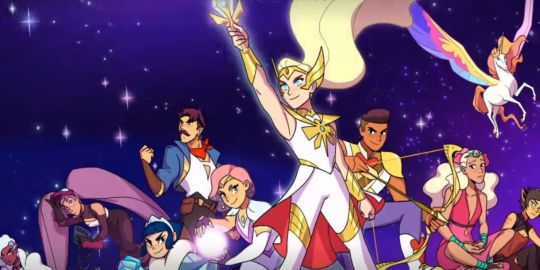
It’s been over a week since She-Ra season 5 came out and I binged it and this is not going to be coherent but I just want to rant about it a bit before writing some more structured metas. I deffo wanna write about Catradora and how I think SPoP is the true spiritual successor to the Avatar.
But first, let me just scream about how good this show is. I already started rewatching it, pretty much straight after finishing it, and I don’t rewatch tv shows often. The exception is Avatar (seen it like 15 times) and sitcoms. But She-Ra is so layered that I felt like I needed to watch it again just to appreciate the dynamics even more.
I already enjoyed the first season but it kept getting better and better. I’m not in love with the art style and it’s definitely for a younger demographic overall than my other favourite animated shows, but like any good kids’ show it balances tone well. It doesn’t talk down to its target demographic but also includes more traditionally mature themes in a digestible and entertaining way. Not all the jokes landed for me but as the series went on I learned to appreciate the tone and the type of humour She-Ra goes for.
It’s funny to me because this is definitely the type of show I would have rejected as a kid, with all the princesses I would have deemed it “too girly” and therefore not for me because screw gender roles. There’s a degree of internalized sexism to that, for sure, a rejection of the feminine because it’s always been seen as less somehow. But there’s also a truth that, at least in my childhood of the late 90s and early 00s, children’s media targeted at girls often had a poor quality to it, at least when compared to “boys’ stuff”.
She-Ra is not only a clever, heartfelt, complex story, it also transcends that binary of having to be either for girls or boys. I know most of modern animation rejects that as well, but She-Ra embraces so many traditionally feminine qualities while also going beyond gender roles and even the gender binary. This show is so queer, man, and I love it. It’s especially impressive when you consider the source material that was literally just the girly version of He-Man. I have no beef with 80s She-Ra, haven’t seen much of it, but this is such an upgrade.
That being said, I would have loved to watch She-Ra as a kid. I’m so incredibly envious of kids, aged around 10, who get to watch this show as they’re growing up. But I am so, so, so happy for them and for the future of animation that shows like She-Ra can be made now, that they’re being made. I’m going to go into spoilers soon, but just before that: She-Ra’s a perfectly enjoyable show in many aspects. I think the worldbuilding’s pretty cool, the story feels coherent and planned out, it’s lighthearted and so genuine. That’s the word that I ultimately choose to describe the series: genuine.
I feel like so much of TV aims to be dark and gritty nowadays, animation included, and though that’s slowly turning to dark comedy or a balance between fun and serious, it’s still the norm. At some point in the last decade, creators became terrified of being judged as cheesy. Even something like the MCU bathes in bathos to avoid being cheesy. But She-Ra proves that creators shouldn’t be afraid of being genuine, of basing characters and storylines on the simple power of love. Like, it’s such a cliché trope but I think that’s mostly because it has become stale.
Noelle Stevenson has talked about the importance of love in her story and I’m so grateful for that. Through, She-Ra, she’s truly proven how powerful love can be in a story and how it doesn’t have to be cheesy. It’s just so unabashedly genuine. The power of love and friendship literally saves the day several times but it’s always so genuine and more importantly it always makes sense that it doesn’t get boring. If the foundation wasn’t there, then I’d say “well this is just super cheesy”. But the show makes a point of building relationships and making them the focal point of the story.
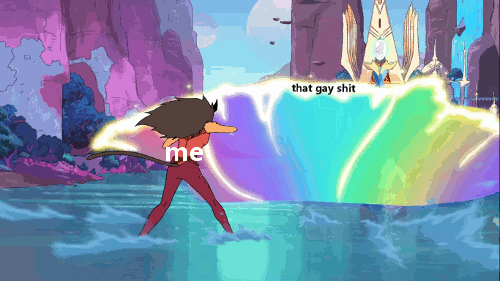
Alright, so, spoilers because I need to talk about character arcs and THAT KISS and just everything. I really need to write more in depth about Adora and Catra and their relationship but for now I feel like it’s so important to appreciate how they’re developed. Everything from their shared childhood to their trauma with Shadow Weaver and the finding their way back to each other, it’s just *chef’s kiss*. It’s so well-written and believable. Ngl, I do have some minor issues with Catra’s redemption arc. Let’s just say that on a scale from Kylo Ren to Zuko, she’s definitely closer to Zuko. I also appreciate Shadow Weaver’s death scene and how it allows them to move on. I didn’t see that one as Death as Redemption and it shouldn’t be. Again and again the show made it clear that she was abuse towards both girls and nothing will negate that.
From what I can tell, the fandom really latched onto Catra, even when it wasn’t clear whether she’d get a redemption arc. I think that’s important, because unlike some characters in animation, Catra’s actions were almost always framed appropriately. There was always an understanding as to where she’s coming from, how she’s acting from a place of hurt, and yet her actions weren’t justified. They weren’t suddenly all okay just because she’s hurt, too. I especially loved in the season 3 finale when Adora was allowed to finally say no, to say that Catra’s actions were not her fault. That season as a whole was beautiful, like, episode three when Adora’s struggling so much and Catra has the opportunity for a better life but she still fails to choose her own happiness because she’s too bitter over SW and Adora? It’s poetic cinema. I love that angst, so well done.
It would be so easy to misfire in Catra’s storyline and either a) write off all the awful things she does because she’s just “misunderstood” or b) irredeemably stuck in her abusive environment with no hope of escape. They balanced quite well there and managed to handle such a complex character with delicacy. I’m quite happy with how Catra was portrayed because on the one hand, she’s painfully relatable to me and I assume to many others. The audience can see their own mistakes reflected in her character because we’ve all been too stubborn, done things out of spite, refused to acknowledge that we were wrong because we were hurting so much. At the same time, I always felt like the show gave me enough space to judge Catra’s actions and acknowledge that she was in the wrong. I honestly think I would have been a better adjusted teenager is if saw this show just before my angsty years, lol.
I’m going to write more about Adora at some other point but I love how vulnerable she’s allowed to be. Protagonists never used to be my favourite characters because they all seemed the same, with two major categories: the stereotypical male hero who can do no wrong or the angsty boi who can be shitty and the text still frames him as awesome. It’s only recently with series like The Legend of Korra and She-Ra that I go “damn, protagonists can be like that, huh.” Adora is a dumb jock who tries so hard and she deserves all the hugs in the world.
Also, Catradora? Breathtaking, amazing, groundbreaking. No doubt She-Ra needed shows like Adventure Time, LoK, Steven Universe and the likes to pave the way but still, it went there. I saw people be anxious about whether they were gonna be queerbaited, but I always, idk, knew? Trusted? That She-Ra would follow through. I didn’t wait six years for Bubbline to happen for Catradora to not get their big damn kiss. The series has been so effortlessly queer from the get-go that it just made sense that they were always heading there. I did see a gif of the kiss before watching s5 and ngl, that spoiler kind of bummed me out in a way that I wanted to be surprised. But even before I saw that I wasn’t worried. And the context of their journey in season 5? That cannot be spoiled by a simple gif. You have to experience that to fully appreciate it and that is the marker of good storytelling.
I understand that, though this should be the norm by now, Noelle Stevenson still had to be smart about how she approached the execs and she wasn’t sure this could happen. I cannot tell you how happy I am about what she said regarding how Catradora was so integral to the story that the execs couldn’t not allow it. That’s so brilliant, and it feels so natural in the story. Queer love saves the day and it’s not ambiguous, it cannot be censored because you lose a part of the story without it. You did it, Noelle, you funky little lesbian, what an icon. I can’t wait to see more stuff from her.
In other news, I appreciated other characters as well, like how all the princesses got to be different and awesome in their own unique way. Season 5 was great for so many characters, Mermista got so much to work with and Spinnerella and Netossa got so much more characterization than in previous seasons. Glimmer continued to be the third most important character in the story and I’m happy about all the relationships that also got to be canon. Good characters and dynamics all around, no wonder since the show is built on that.
Such a satisfying conclusion and one that makes you feel like this is just part one of a much bigger story. Such genuine, heartfelt moments, well-developed characters, complex themes explored in a respectful and digestible way, and such an unapologetically fun show. Melissa Fumero as a side character? Yes please. Catra’s new haircut? Heck yeah! She-Ra’s new design? Oh my.

I’m not even like, super into She-Ra, and I usually don’t write so much about things I only watch casually. But this show is so good and important that I had to rant. And I will write more about it eventually, but for now I needed to get all of this out. I’d give it a better structure but if I really get into I might never end up posting it so for now here, have this ramble of love. She-Ra, of all shows, deserves that.
#she-ra#spop#she-ra and the princesses of power#catradora#spop spoilers#my thoughts#that's pretty much it for now
144 notes
·
View notes
Text
1129
[created by: youvebeensurved - LiveJournal]
How often do you get fountain drinks from a gas station?
I’ve actually never tried getting a drink from one of those fountains. I find them nasty, and the fact that gas stations aren’t the most hygienic of places certainly doesn’t help their case.
If you get online and look at graphics, what website(s) do you go to?
I never find myself looking for graphics. The closest thing I search are vector icons, and for those I have an extension on Chrome that lets me look for icons to place on slides and such.
Who would you say your favorite celebrity is?
At the moment it would be Rosamund Pike, but my all-time favorite would be Beyoncé.
Have you ever slept in your car? If so, explain.
Sure, mostly when I took naps in between classes. There were also a few times I had late nights out and didn’t have a place to crash at, so I’d sleep in the car for the night before heading home in the morning.
If you were forced to murder one of your parents, which one would it be?
This is a horrible question.
What song are you currently obsessed with?
Find Me Here - Hayley Williams.
Explain your last run in with the police:
Never happened.
Who was the last friend you hung out with, and what did you guys do?
In terms of a physical get-together, I was with Angela, Hans, Pia, Kyelle, Al, Gab, and Sam and we had dinner and drinks at this gastropub that announced its impending permanent closure by the end of February. Virtually, I hung out with Andi, Peter, Carmel, Rita, Robin, Mik, and Elis to have a Jeopardy game night over Zoom.
What time do you usually go to bed and wake up?
On weekdays I try to turn in anywhere between 9–11 PM and wake up by 6:30. On weekends, I try to stay up until midnight at the earliest, but I’m trying to make it a habit to stay up until like 2–3 AM just so I can catch up on my hobbies and shows. I wake up anywhere between 5–7 AM.
If you could have any job in the world, what would it be? What's stopping you?
Lawyer, which is a route I seriously considered for a few years. I get extremely tense in arguments though so I doubt I’d be the best fit for that kind of career.
Do you have a friend that's in a horrible situation right now? Explain.
Yeah, my college batchmate (who’s now also my co-worker) Aimee tested positive for COVID this week after being in and out of a fever over the last two weeks.
What was the last store you were in, and what did you buy?
I suddenly needed plastic bags while I was packing groceries at the office the other week, so I went to the nearby convenience store to check if they had any. They didn’t, so I left without buying anything.
Who was the last person you texted, and what did this text say?
I was texting some media friends to tell them some shoes we had ordered for them to try out are going to be delivered to their address within the day.
What is the reason for the last time you cried?
A show I had been watching had an emotional scene.
Who is your favorite character in your favorite movie?
Joanna, of course, mainly because that’s the character Audrey Hepburn plays.
What color did you last paint your nails?
I can’t remember the color I chose the last time I had my nails painted 79472394348 years ago.
It's 112 degrees out today, describe your attire:
A very thin tank top with airy shorts.
Do you have any friends that are currently in jail? Explain their situation.
Not friends but I can think of a couple of relatives who’ve gotten ‘in conflict’ with the law. I won’t get into their cases but for both of them, it was because they got tricked by their respective abusive bosses, hence the quote marks.
Do you tend to take long or short surveys?
I like taking those whose lengths are right in the middle - anywhere between 35-80 questions. Shorter ones look boring and I find the longer ones too time-consuming.
What do you currently desire?
I changed my mind about La Creperie and will be going to Ramen Nagi instead since I just remembered they currently have a truffle ramen thing that’s only going to be around for a limited time, and I want to get my hands on it before they take it off the menu.
How often do you honk your horn?
Depends on how stupid the people I’m driving with are on a given day.
For what reason were you last at a park?
We don’t have too many parks here so there’s little opportunity to stay at one. I remember seeing one with Gab when we were at BGC a little over a year ago, but we only walked through it since it was part of the route we were taking to get to our actual destination.
What junk food can you never pass up?
Salted egg chips and pizza.
If you're a girl, what is your favorite brand of feminine hygiene products? If you're a boy, what is your favorite brand of condoms?
I don’t have a favorite.
Where was the last place you went on a walk to?
Just around the neighborhood. I also wanted to make this morning’s route with Cooper a little longer so he could walk more, so we went to parts of the village we don’t normally reach.
How are you feeling today?
I’m content :) It’s the weekend so I’m not too tense like I normally would be on weekdays. I also have plans to go out later today so I’m looking forward to that.
Do you ever make your own surveys?
Never tried because I know I wouldn’t be able to come up with new and interesting questions.
How flexible are you?
Not very. I can’t even reach my toes when I do stretches.
What is your favorite class?
Any history elective. I also like biology, anthropology, and some aspects of political science.
What is your boyfriend's name?
I don’t have one.
What is your favorite drink?
Non-alcoholic, cold water. Alcoholic, Long Island Iced Tea for mixed drinks, and tequila.
Who is your best friend?
Angela.
What time is it?
11:20 AM.
What is your middle name?
My second name is Isabelle, but I’m not sharing my legal middle name.
What 3 websites do you visit daily?
YouTube, Google Suite, and Twitter.
Where do you work?
At home, haha. But under normal circumstances I’d be working in an office somewhere in Metro Manila.
What is your favorite band?
Paramore.
How do you feel about abortion?
Personally not a fan of the procedure for myself, but I am as pro-choice as it gets.
Do you want any kids?
Very much so.
Have you ever microwaved soap?
Nah, but I know what happens to it from watching YouTube videos hahaha. It’s so fun to see it gradually expand and become a pretty lil cloud.
Are there any new movies that you want to see?
I Care A Lot, but I feel sooooooooo lazy about watching new movies. Idk if I’ll ever get around to it.
How many places have you lived?
I’d say around five in total, including the house I currently reside in. I’ve lived in my parents’ apartment in Manila, then we briefly moved in with my dad’s parents, and then I spent most of my childhood in a duplex living with my mom’s side (and got to live in both houses), until we finally settled here when I was 10.
Do you have any health issues?
Yeah, the main one I have to live with is scoliosis.
Are you texting anyone?
Nope. And I don’t really text anymore, either. Most of my conversations take place on Messenger or Viber.
What do you drive?
A Mitsubishi Mirage hatchback.
Have you ever had a crush on a teacher?
Sure, both male and female ones.
Are you drinking or eating anything?
Nope but I am starting to feel a bit hungry.
What color is your shirt?
Yellow with some grey text.
Do you drink?
Like...alcohol? Sure. I have the occasional soju night.
What year do/did you graduate?
I graduated high school in 2016, and college in 2020.
Do you play any sports?
Table tennis, though it’s been a while since I’ve had the chance to play. I got to take it as a PE elective on my last sem, but my time with it got cut off because of COVID :(
Do you pop your fingers?
Yeah, I just cracked my knuckles a few minutes ago.
What is your shoe size?
I can wear a size 6 or 7.
Have you ever had a UTI?
Apparently I’ve had one, but all I got from it was a persisting high fever. I didn’t actually have any difficulties or felt pain in my urinary tract, though of course I felt scared to pee during that time because I thought it would hurt lol.
What was the last thing you baked?
Cookies. A lifetime ago, since I don’t normally bake.
When was the last time you showered?
Yesterday afternoon when I was finally able to clock out of work.
Would you rather go to the dentist or the doctor?
Dentist. I actually find the procedures soothing. There’s a whole lot of issues that can be unpacked when you visit doctors, so I’m kinda scared of that.
Have you ever been in love?
Yes. I miss the feeling and being able to act on it, but I’m liking being with myself too.
How do you feel about public speaking?
I’m ok with it for the most part. I know I can speak well and generally have a good hold of my thoughts, so I don’t mind if I have to do it unless I have to talk about something I’m greatly unfamiliar with, like insurance or economics lmao. The latter situation is the only time I’d feel unprepared or scared of public speaking.
Do you see anything green?
Yeah, since we have artificial plant accents on the coffee table.
What shoes do you usually wear?
Sneakers or running shoes.
Do you take any birth control?
Nope.
Who is the last person you talked to?
My sister; I just asked her to turn the volume down on the TV.
Are there any fast food restaurants that you refuse to eat at?
Just Tokyo Tokyo. I can take or leave Burger King but for the most part I find their burgers too plain.
Do you recycle?
Whenever I can, yeah.
Do you know what you want to major in in college?
I wanted to take up journalism. I suppose I don’t regret it, since I ended up wanting to be in a field that’s close enough to it anyway and I don’t feel like the skills I learned went to waste.
Have you ever snuck anyone in your room?
Nah, I always let my mom know if I’m letting someone over since she doesn’t knock and would find out anyway.
Who was the last person in your bed besides you?
Gabie.
Have you ever been in the hospital?
Other than when I was born, yeah, at least once.
What's the last movie you watched?
I watched Midsommar with Nina and some cousins last Christmas lol. We unknowingly downloaded the Director’s Cut, which we found out wasn’t as good as the main version since they added cheesy scenes to it, which ruined the suspenseful mood of the movie.
What's your favorite fruit?
Avocado.
What do your bathroom walls look like?
The bottom half has coral-ish tiles, while the top half is just a plain white wall. In the downstairs bathroom the setup is the same, but instead of coral tiles we have light blue wall tiles instead on the bottom half.
What do you spend most of your money on?
At the moment, most of the money that I do take out of my account is the money I give to my parents every couple of weeks to help out with the bills. The next main thing I spend on is food, because I always have cravings I need satisfied haha.
Do you have any weird obsessions?
Reading about serial killers and unsolved crimes isn’t really considered ‘weird’ anymore since a lot of other people have taken up the interest. But that’s probably the most out-there ~obsession that I have.
Do you bite your nails?
I do but not obsessively.
What's the last color you dyed your hair?
I’ve never tried dyeing my hair yet.
How do you feel about mustaches?
Not my personal preference, but you do you.
Is there anyone that you really want to see in concert?
Beyonceeeeeeeeeeeeee.
2 notes
·
View notes
Note
Katara!
KATARA KATARA KATARA
why I like them
oh god where do i even start. katara just contains so many multitudes - she's sweet and feminine and caring and attentive but she's never reduced to just that, she's never just 'the girl', she's also allowed to get mad, to be petty, to laugh at her brother, to be headstrong and stubborn, to express vulnerability, to cry and to laugh, to make ridiculous facial expressions and *be* very expressive. she's dealing with a lot of trauma not simply from the loss of her mother but that loss represents also how her tribe have been decimated by the fire nation, how she's the last waterbender, how all this pressure exists on her shoulders (but also pride, but also determination, to bring it back) and that is expressed subtly throughout the series with the same depth and love that male characters are afforded with regard to their respective traumatic experiences. and despite all this she never tries to stop making the world good? She's always pushing for change, she's always wanting to make things better, she's relentless and doesn't give up when it comes to her vision for a better world... she has such a big heart. and that coexists with a deep anger in her, and deep hurt. Not to make an ocean metaphor so early on but she's as deadly and deep as the ocean but she chooses to be kind and warm and that's so powerful.
why i don't
honnestly while katara's instincts to mother people are a sad symptom of how she was forced to grow up to soon and automaically asigns herself a role of emotional responsibility she has mixed feelings about, i know that if katara tried to mother me, i would be annoyed. but that sounds more like a me problem.
favourite episode
oh it's either the episode where she beats the fucking shit out of pakku or it's the southern raiders. the first one because it's so gratifying to see how she's grown and developed as a bender and really come into her own. the second because... god i love how *messy* the southern raiders is, and it really taps into what i love about katara - she's flawed, she runs off on an ill-thought out revenge mission with zuko, she's got a great capability for darkness as she quite seriously considers murdering a man she has every right to loathe and to kill - but she chooses against it, in the end. it would not be right for her, if not him. she chooses what's right for her in the end.
favourite season
I'm gonna be a wee bit controversial and say book 1 had the best conception of katara's arc from student to master and really saw her grow and flourish, from someone yelling at her brother' oafish prejudice to a real master, that really solidified her as an idealist and presented that as the strength that is, that showed her struggling with petty jealousy of aang's progress and had her stumble in ways that made her character comeplling and interesting - like what an introduction to her character! book 2 had some fantastic moments but i can't think of anything particularly remarkable about hee character arc - largely because it tied into aang's romantic arc i think at this point. book 3 had some absolutely fantastic moments (scam queens katara and toph!! painted lady!! southern raiders!! the final agni kai) that really shone but also book 3 lays a lot of groundwork for fanon i hate (e.g. katara as the mom friend - wish that headcanon would die tbh)
favourite line
fuck there's a lot of good ones but my underrated fave is when sokka says he's kissed a girl before but she's never met her and katara says 'Who? Gran-gran? I've met gran-gran' and it's bruuutaaall
but my favourite serious line is 'I will never ever give up on people who need me'. powerful.
favourite outfit
water tribe anything!! and i actually think her book one/book two braids are her best hair. underrated katara hair. personally she looks just adorable in her parka in the flashback to when she was like. eight.
OTP
katara/personal fulfilment
katara/happiness
katara/fulfilling her goals and dreams
katara/loving minor background character who is never named
there's some ships i like in AU situations - yuetara is actually one i lov, especially with waterbender yue, i just love the whole sea/moon thing as well as katara and yue rebelling in loud/quiet ways, being girlfriends who refuse to have their lives defined by the expectations of older men, who have a great sense of duty towards their nations and won’t let gendered expectations stop them.
and most of you know i like the messy drama of katara/azula in a lighter AU situation where they're like, school or academic rivals, and the legacy of imperialism isn’t quite so personal (and azula makes better choices, obviously), but it’s not as much as i “ship” them as i just find the potential dynamic interesting, they’re both driven by a sense of duty for their home, it’s just that means *very* different things depending if you’re SWT or FN.
none of them are OTPs though - they’re more just fun thought experiments
brotp
katara & sokka - absolutely love their sibling dynamic its amazing. both have been impacted negatively by the shit in their lives and are not always dealing with it in functional ways but theyre there for each other, through thick and thin, always have each other's backs, they roast each other and bicker and sometimes make stupid decisions and sometimes lash out but at the end of the day their love pulls through, they’re able to work past those conflicts.
katara & aang - honestly while i feel kataang was just so poorly executed in the show (listen guys I just can’t after ember island players, i know that was a bad episode, but i can’t) & i cant imagine katara wanting to leave the south pole after the war for long spells (it would have to be long distance love, lots of profound and heartfelt letters and occasional visits, if anything, but i dont know if that’s what katara wants or needs? so maybe it wouldn’t pan out?), but regardless, i really do think these two had a life-changing friendship where each really represented hope for each other, that's at the core of it, they both truly believe in each other, and inspired each other. katara & aang good.
a headcanon
chief katara anyone?? chief katara?!?!
oh oh OH i also think that katara, while primarily a combat bender during the war, actually takes to healing a lot more after the show and gets proper healing training at some point with the help of a trained medical expert and maybe yugoda. tbh i feel like the show was a bit dismissive of healing as an ability - i feel like having that is *extremely* useful in any combat situation, you always have a medic on hand - but i understand why katara, who wanted to be recognised as powerful regardless of her gender, and wanted to hold herself in a fight alongside sokka & aang, pushed for combat waterbending training because that is what 'powerful' looks like to her in the moment. obviously katara is capable of incredible healing feats (see: saving aang) but i think given we see her as a healer in lok (not a decision i necessarily disagree with) would mean a shift in focus. i think katara actually comes to realise she likes healing a great deal, but really she excels in all aspects of waterbending and is the south’s most respected master who helped rejuvenate southern style waterbending
unpopular opinion
the main reason people think katara is straight is because we see her have very few meaningful interactions with other girls outside of toph. ATLA as a show is a bit romance obsessed, and very heteronormative in that regard, and so interactions with minor characters almost always line up with a potential crush for sokka or katara, and later, zuko (suki, haru, jet, yue, song, jin....). we rarely see katara build friendships with other girls and it’s such a damn shame.
(anyway bi katara for life)
a wish
the version of the puppetmaster we saw was actually fire nation propaganda, i feel like katara would have felt deep compassion for a prisoner of war and after maybe some clashes, would have agreed to help smuggle her out of the fire nation and secure passage home for hama, and tried to assure her that she still has a place there. the treatment of hama in that episode was awful (but also hama was written to be almost cartoonishly evil, very much an evil witch in her cottage in the spooky woods? like the whole horror movie / spooky story opening was such a big tell) and tbh i reject the thesis that we saw ‘katara’s dark potential’ in that episode completely, or that bloodbending as a power is inherently dark, or katara’s use of it to stop hama ‘corrupted’ her. I feel like katara might feel this way as a teenager perhaps but with time (she can be a little black and white at times), and especially with more training as a healer, i think she might realise that’s not the case, she’ll realise that she was right to try and oppose hama, her elder (she was lashing out rather than really trying to oppose the fire nation), and it wasn’t a betrayal of her or her beliefs, but also her use of bloodbending wasn’t wrong or evil inherently at all? and maybe she’d find ways to use it for healing purposes? anyway my wish is that, i like the idea that they meet again, speak about their differences, reconcile a little / come to an understanding, and katara learns more from hama again
an oh-god-please-don't-ever-happen
anything where katara’s character is reduced to a comforter or a healing device for a man and his trauma. particularly zuko. (they don’t have that dynamic in canon thankfully, zuko would never, zuko respects her too much)
5 words to describe them:
idealistic, hard-working, powerful, headstrong, kind
my nickname for them:
chief. or comrade. :^)
7 notes
·
View notes
Text
Mini-essay: How the narrative of KH3 was damaged by the compulsory heterosexuality and gender norms of Japanese society
Major spoilers of Kingdom Hearts 3 are below. Please don’t look unless you’ve finished the game!
One more disclaimer: this is coming from a Japanese perspective, and it’s not meant as a xenophobic attack on the culture I was raised in.
Light-and-darkness logic, time travel, and bosses who are giant ships, I’ll ignore. That’s just part of the Kingdom Hearts package, and despite the headache they might give me, I’ve come to accept these wild ideas and take pride in my ability to handle them. But when we stray from the fantasy, it becomes difficult confronting the cultural context that the Kingdom Hearts series is birthed from, and how these ideas have affected key plot points and the characterization of our beloved heroes.
Despite its stunning popularity overseas, the Kingdom Hearts series is still conceived in Japan (by middle-aged Japanese men, no less) for Japanese audiences. I’ve always felt that Square Enix as a company remains disconnected from the input of its non-Japanese audience. Whatever catering is done towards overseas players is limited to game mechanics, not plot. I expect there’s something of a よそはよそ、うちはうち (“That’s fine for them but not for us”) mentality when it comes to structuring the story in a way that may appeal to overseas (specifically Western) fans. The writers do not know how to do this, and they do not wish to. I don’t believe that any culture should have to adjust its creative output to make it more palatable to the outside world, but considering the sheer size of the Kingdom Hearts fanbase, such a blatant refusal to consider modern storytelling trends in the gaming world will—and has—damaged its enduring legacy. Let’s not forget the fact that Japanese society itself is not suspended in time; its younger generation has different ideas about gender, sexuality, and romance.
I’d like to discuss three examples in KH3 where the writers leaned heavily on traditional gender norms and heterosexual romance to the detriment of the plot and the integrity of previous characterization. First, there’s the matter of Subject X, the amnesiac girl who became the reason why Ansem the Wise shut down his experiments. We learn late in the game that she was Lea and Isa’s missing friend, and the reason why they chose to infiltrate the castle and join Organization XIII. Before this piece of knowledge was revealed, Lea and Isa remained the only (human) pair whose friendship existed outside of the boy-girl-boy dynamic that Nomura is so fond of. Like Axel and Roxas prior to Xion’s introduction in 358/2 Days, Subject X was retconned into their friendship, altering their dynamics and diluting the significance of the homosocial relationship. Putting aside shipping perspectives, it is important to be able to portray two men (nevermind the prospect of two women, that’s too much to hope for in this franchise) sharing a strong emotional bond. Falling back on the trio concept not only feels like lazy and tired writing, but seems to speak to a fear that without a female presence, the love and connection between two male characters is simply too homoerotic.
In an interview, Nomura remarked he was surprised by Aqua’s popularity since she did not resemble previous Kingdom Heartes heroines. He and other writers (Masaru Oka and perhaps others) have a clear idea of what femininity means and what role female characters should play, and that was never clearer than the portrayal of Kairi and Aqua in the final half of the game. After being chosen as a Guardian of Light and spending the entirety of the story training with Merlin, after promising Sora that she would be the one to protect him, Kairi’s helplessness in the final battle was appalling to witness. She is depicted as weaponless when Terra-Xehanort charges at her. Sora and the others throw themselves in front of her to protect her, and this leads directly to Donald’s self-sacrifice. Later, she is easily kidnapped by Xemnas and killed by Master Xehanort to fuel Sora’s anger. This act of textbook ‘fridging’ absolutely disregards Kairi’s agency and her wish to fight alongside her friends. She represents the worst depiction of the traditional female role in storytelling: she is an object of desire to be rescued, damaged, and won over. In other words, it’s bullshit. Likewise, although she is one of the three Keyblade Masters present in the story, Aqua is constrained to a passive role. She is first rescued by Sora, then by Ventus, then assisted by Sora once more against two opponents (Terra-Xehanort and Vanitas) she had previously beaten. When confronted by the Demon Tide in the Keyblade Graveyard, Aqua whispers “no” and lets her Keyblade slip out of her hands, defeated. This is not the same Aqua who survived over a decade in the realm of darkness, defined by her bravery and strength of will. In an era with an increasing number of female-led titles and queer, non-traditional characterization, the female characters of Kingdom Hearts are still relegated to the role of nurturer and caretaker. In a game released in 2019, that hurts.
Finally, I’d like to argue that the narrative focus on Sora and Kairi’s romance came at the expense of the friendship between Sora, Riku, and Kairi, something I believed so thematically important to the franchise. The other trios (Axel, Roxas, Xion and Terra, Aqua, Ventus) are depicted as being equally close and connected, yet KH3 does nothing to showcase Riku and Kairi’s bond. Riku is about as affected as Mickey when Kairi is threatened. The two of them never have a private conversation, not even the day before their final confrontation with Master Xehanort. Riku doesn’t volunteer to help Sora search for Kairi at the end of the game, despite him being aware of what damage it could cause Sora. And that is the other piece of the puzzle: Sora and Riku’s relationship has also been severely downplayed. During the events of KH3D, Riku becomes a Dream Eater out of his strong desire to protect Sora. His character arc has always been about “protecting the people who matter most”. Why, then, is he willing to let Sora abuse the Power of Wakening on his own? Why doesn’t he get to have a conversation with Sora before the final battle? Why is he shown racing against Terra and Roxas in the epilogue, while Kairi sits by herself and mourns? The lack of bond isn’t just present on Riku’s side. When Kairi and the others are swallowed by the Demon Tide, Sora falls to his knees and laments that he has no power now that he’s alone. His grief would have been more convincing, had Riku not been right there by his side. With such a strong bond remaining, there’s no reason Sora should have given up there; it was a deliberate narrative decision to highlight Sora and Kairi’s relationship while downplaying Sora and Riku’s. It seems that Riku was forced to take a step back to make room for the game’s heterosexual romance, and I believe the integrity of Sora, Riku, and Kairi as characters suffered because of this.
Many of the reunions in the final portion of the game were an emotional catharsis for me, and I did enjoy aspects of the story. That being said, the storytelling in KH3 makes me fear that Square Enix is either unwilling or unable to adapt to the gaming frontier now led by the West. For now, I’ll submit to the fact that the most satisfying conclusion to the series I’ve followed so long lies in the hands of the fans who are willing to do it justice.
3K notes
·
View notes
Text
People What Aint From Round Here Is The Problem...
So I just watched Once Upon a Time... In Hollywood and I have THOUGHTS:
Ive read a few reviews&ruminations on this film at this point and I can’t believe that none of them got(or at least, mentioned explicitly) the primary thesis of this movie, spcl given that Tarentino flatly states it out the mouth of his primary protagonist within, like, the first 15-20mins of the film: “...most important thing in this town is when you’re making money you buy a house in town. You don’t rent... Hollywood real estate means you live here. You’re not just visiting, not just passing through. You fuckin live here.” i.e., the most important thing in Hollywood, to Hollywood, is the people FROM Hollywood; Everyone else is just a filthy, trouble-making tourist or profiteer who is “Passing Through” and “Doesnt Get It” and “Is Fucking It Up”(It being the film industry), and probably “Secretly Hates Movies”. There are places and aspects of this movie that are basically a Nativist Angeleno rant, written by a life-long Angeleno film-nerd-turned-film-maker, against Hollywood’s critics(and his critics which he just totally conflates with the former), and probably non-Angelenos(and non-Californians?) in general.
There are two ways to read this thesis: Straight and Subverted/Satirized.
The evidence for reading it straight is pretty plentiful. Lots of reviews have puzzled at where the line connecting the constant hippie-bashing, the weird focus on knocking Polanski’s Polishness & preference for shooting in London, and the inexplicable pot-shot at Bruce Lee is, and I think this is it. “The Hippies” are repeatedly presented as a corrupting force: digging through trash, living in squalourous filth at the Spahn Ranch dragging members of “Old Hollywood” like its owner into it with them, selling drugs, and using sex to “control” men. And attached to this is presenting “The Hippies” as foreign; not only from another place, but refusing to assimilate with the LA way of life and hostile to it. The Manson family are the only explicitly identified “Hippies” in the film(other than, possibly, the one who sells Cliff an acid cig). The only “positive” portrayals of Bruce Lee in the film are silent ones of him teaching anglos kung fu, which has some fairly obvs and well-understood Implications.
But there’s also good evidence for reading it as subverted and satirized. Both Tate and Dalton are NOT from California, let alone LA, and Booth’s origins are left unclear. Dalton’s the only one of them explicitly id’d as being from elsewhere(Missouri), but Tate’s easy to google and she was a military kid who grew up all over the place. When Dalton returns from Italy, that sequence and his look in it are VERY reminiscent of the scenes introducing Polanski at the beginning of the film. The side-characters around Tate, perennially shown in a positive light, are also non-Angelenos. Doing Spaghetti Westerns revitalizes Dalton’s career, despite his disdain for Italian cinema. Tate and her crew, while not explicitly ID’d as “Hippies” and often shown in Mod and other fashion styles, are also presented in “Hippie” fashion, shown listening to “Hippie” music, smoking the “Hippie” Reefer(Im sorry, but Comedy Demanded this phrasing and I am Devout u_u), and implied to be living a polyamorous “Hippie” life.
It really is difficult for me to say which predominates. On the one entirely metaphorical hand, the ways in which Dalton’s Angeleno chauvinism are subverted and mocked are fairly obvs, but on the other emh, the film is FILLED with LITERALLY GLOWING nostalgia for this pre-Hippy, pre-Lefty, pre-70s, Conservative and Republican California&Los Angeles. Dalton’s focus on property-ownership&the film industry in the opening thesis could easily be seen as resolving these subversive contradictions to allow for a straight read(ie: Tate, Booth, and Dalton are “Hollywood People” who’ve both bought real-estate in LA, and who’ve grown up in film or film-adjacent fields and choose to center their adult lives in the film industry). So much, in fact, that I kinda started to wonder abt QT’s politics while watching it. And, if it WAS satirical, then what’s the point of the knock to Bruce Lee and focusing criticisms of Polanski on his Polishness and shooting in London? Is that just meant to characterize Dalton and Booth as nativists and racists?
It really cannot be said enough that there are REALLY MORE APPROPRIATE CRITICISMS to make of Polanski than 1)begin Polish, 2)possessing boyish effeminacy, and 3)preferring to shoot movies in London instead of LA. Which are this movie’s only problems with him(though it also takes the time to show him bitchily smoking a cigarette in an evening gown while being rude to a dog). Obvsl I dont object to villainizing an ACTUAL REAL LIFE VILLAIN like this shitstain, but I DO object to being asked(albeit gently) to participate in this film’s understated nationalist bigotry.
It’s possible that Cliff’s turning Pussycat down during the drive to the ranch was intended to be this but I highly doubt it. And if it was it’d be misrepresenting Polanski’s misdeeds enormously, considering that Pussycat, the too-young girl, is the sexual instigator in this film. Polanski liked to manipulate, drug, and rape underaged girls(he pulled the same shit with models in Europe before getting busted for it in LA, btw, then continued doing it after fleeing back to Europe); really not the same situation.
There’s another irony in that, while the film goes out of its way to call Polanski “boyish” and imply that makes him feminine and that this is Bad, there’s also a subtle under-current that... Tarentino sees himself in his youth the same way? He’s certainly never been short like Polanski and Jay Sebring are/were, QT’s 6 1, but the actors he cast to play them and the description made of the pair in-film are more than a bit reminiscent of how Tarentino looked&was discussed in the press back in the 90s when he was starting out. AAAaaand the film explicitly calls that Tate’s “Type”; leaving me with the question: would Tarentino be able to stop himself from implying a dead starlet would have been attracted to him? I leave the answer to your imaginations, Dear Readers u_u
Having said all that it IS a really good film, which I liked, I dont think it’d be very hard to set aside this political stuff while watching, the driving sequences are especially emotive&exhilarating, and there’s some seriously great acting in it. IDK if I’d say I liked it more than the recent Emma movie, tho.
I feel like each of the trio, Tate, Dalton, and Booth, were meant to symbolically Embody LA/Hollywood/California? Like Pitt especially seemed to be channeling movie characters and CJ from GTA: San Andreas throughout his performance, while I couldnt help but think of Ronald Reagan watching DiCaprio(spcl given the character’s likely politics). So there’s this sense in which the film is a fantasy of “Old Hollywood”, embodied by these three, Vanquishing its “Enemies”, represented by The Hippies(moralizing, pretentious, gross leftist) and potentially Polanski&Lee(foreign film ppl who refuse to integrate into the LA scene). Again, given the political history of Cali after this era, this embodiment raises some questions for me abt the film and QT’s politics(particularly in re: misogyny and feminism).
Also DiCaprio is totally going to get pitched a Reagan biopic off of this role and I sincerely hope he has the good sense to turn that shit the fuck down.
Circling back to the ranting at his critics, this movie was definitely and consciously a response to them. Like: up until the last 5-15 minutes of the film, and aside from a handful of too-lingering too fetishistic too on-the-nose creep shots of the female cast that Tarentino simply could not stop himself from making, OUATiH is precisely the sort of “Serious” film Tarentino’s critics have been saying he should make for decades now(of course he did Jackie Brown, which was that and which he blew Completely out of the park). And then there’s that bloody, gross-out, exploitation-movie ending. I dont actually think it was as bad as many critics were saying it was? For some reason I was thinking there was gonna be a massacre of the ENTIRE Manson family, which would have been totally out of left-field. But it WAS clearly a stinger of a major tone-shift thrown in as a Fuck You to the ppl who’ve called out his violent and exploitative preferences throughout the years. As for me I generally like his movies and think he’s a great filmmaker but he absolutely does go too far sometimes.
Rick Dalton, in an evening-gown, with a mixer full of iced-margarita in one hand, getting all up in the face of the driver of a loud exhaust-spewing jalope in his PRIVATE STREET was TOTALLY Tarentino himself :| By which I mean NOT ONLY that That’s ABSOLUTELY the sort of cameo he would have given himself 30 years ago and if it made any sort of sense at all in the film(which here it wouldnt have, obvsl), BUT ALSO that I feel 94% confident that Tarentino has actually done that at least once in his lifetime :| :|
I think the monologue&interactions T gives Bruce Lee leading up to the fight were probably more insulting to him than the fight itself. Contrary to popular discussion, it isn’t Pitt’s character totally trashing Lee, he gets in one good throw after Lee repeats a successful attack at his request(which I doubt Lee would have ever done from what little I know about him; not being predictable in a fight was his whole Deal), but rather an even duel between them(most of the fight is just the two blocking each others’ attacks). I dont think the film was trying to say “Lee was full of hot-air”, if it wanted to say that it’d have shown him getting trounced instead of showing him knock Booth down then trade him blow for blow, but more “Lee was pretty arrogant and a bit pretentious”.
OK, that’s abt all that I can think of right now: thanks for reading ^v^
#Once Upon a Time... In Hollywood#Quentin Tarentino#Long Post#Cinema#zA Reviews#Movie Reviews#zA Commentary#zA Opinions#analytic posts
5 notes
·
View notes
Text
Pachamama: Mother Goddess of Inca
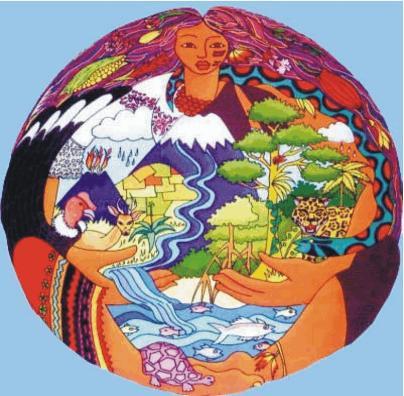
Pachamama is the Supreme Goddess honoured by the indigenous people of the Andes including Peru, Argentina and Bolivia. Pachamama is referred to as both the Physical Planet Earth as well as the Universal Feminine Energy in Time and Space, The Cosmic Mother. Pacha is an archaic Quechua word meaning universe, world, time and space. So She is in fact the Goddess of all that exists for all time, eternal.
She is considered the Mother who begets life, nourishes and protects. In Her role as Earth Mother, She oversees planting and harvesting and is responsible for the well-being of plants and animals. Offerings are made to Her regularly for success in all endeavours. Pachamama is often depicted as a huge Dragon as She represents the Andean Mountains. When She feels disrespected, She may cause Earthquakes. The Andean People believe that recent quakes in the region are a direct result of humanity’s disregard for the planet. Pachamama is showing us Her displeasure at our attitude toward Her. The Andean People also believe Pachamama teaches us that work is a supreme virtue. For if we build, create, plant etc . . . with love in our hearts, our work will be sacred and we will be sacred. In this way, love and work may take us to a state of higher consciousness much like the Karma Yoga of Eastern Religions.
Apachetas
Offerings to Pachamama are referred to as Apachetas. The apachetas most often consist of a hole, or well, dug into the earth within which is placed the offering and piles of stones are placed on top. Offerings may include cooked food, coca leaf, grain and corn flour, wine, cigars and chicha (a fermented drink). Each village would have a ceremonial apacheta and individual homes may also have one. They are also found throughout the Andes at mountain passes. The sacred cairns are used for offerings for a safe journey through the mountains, or may be used to indicate where the trails lead. These cairns may also indicate an energetic opening or doorway. The apachetas are also symbolic of the Triple Goddess aspect of Pachamama. The stone cairns represent Pachamama Sky (Janaj Pacha), the offerings refer to Pachamama Soil (Kay Pacha) and the well itself represents Pachamama in Her aspect as She Who is Queen of the Underworld (Ukhu Pacha).
Pachamama is honoured on August 1 and the entire month of August is devoted to Her. She is also revered on the First Friday of every month and may also be prayed to prior to undertaking any new project. Offerings are buried in the apachetas to “feed the Mother.” Prior to planting, permission is asked of the Mother to hurt Her with plows to prepare the soil. At this time, men will stab the soil with plows shaped like spears, and women will follow singing to the Mother as they plant the seeds.
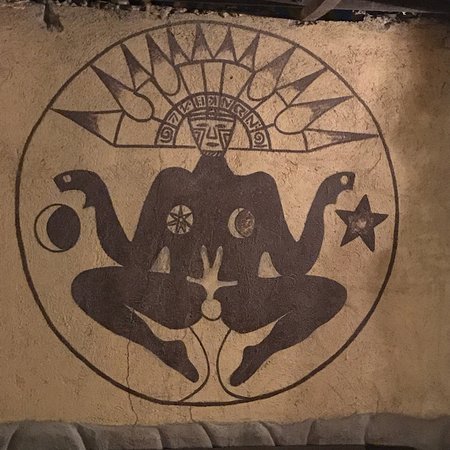
Mythology
Pachamama birthed the God Pachacamac and He became Her consort. Together they created the Stars, Sun, Moon and Planets. They lived on an island in the centre of a lake atop White Mountain (Nevado de Cachi). The island is inhabited by a bull with golden horns who bellows like thunder. Pachamama bore twins, a boy and a girl. Soon after, Pachacamac disappeared. The Widowed Goddess, alone with Her Children, lived in darkness and solitude. One night, they saw a bright flame in the distance and began to follow it. The trio faced fearsome monsters as they made their way to the light. They finally reached a cave and met Wakon, the Brother of Pachacamac.
Wakon asked the children to fetch water to boil potatoes and while they were gone, He tried to seduce Pachamama. When She refused His advances, He killed and devoured part of Her and kept the remainder in a pot on the fire. The Twins returned and asked about their Mother. Wakon told Them, She would return shortly but days passed and She did not return.
The Children befriended a bird who knew what Wakon and done. He informed the Children of Their Mother’s fate and that They too were in danger. The Children were advised to enter the cave where Wakon slept and to tie a large rock to His long hair. They then escaped from the cave and fled. They met Fox and explained what had happened. Fox offered to hide the Children in his den.
Meanwhile, Wakon awoke and was so angered that the Twins had fled, He did not notice the boulder in His hair. He went in search of the Children, meeting Cougar, Condor and Snake. The animals loved Pachamama and refused to tell Wakon where the Twins were. Wakon met Fox who shrewdly suggested He climb the highest peak and mimic the voice of Pachamama calling for Her Children. Wakon did so and as He peered over the steep mountain to seek Them, the stone in His hair dislodged, tumbling into the abyss below and Wakon, still entangled, followed the stone. His death caused a violent Earthquake.
The Twins lived with Fox for a time but They missed their Mother. The Girl had a dream about finding a doll, broken in pieces. She related the dream to Her Brother and while doing so, She threw Her hat into the air where it began to spin. As the Children gazed in wonder, a rope emerged from the sky. They decided to climb it and reached the Heavens where They were reunited with Their Father, Pachacamac. The Boy was transformed into the Sun and the Girl became the Moon. As for Pachamama, She remained forever on the mountain in the form of an imposing snowy peak. To this day, the Mountain is known as The Widow.
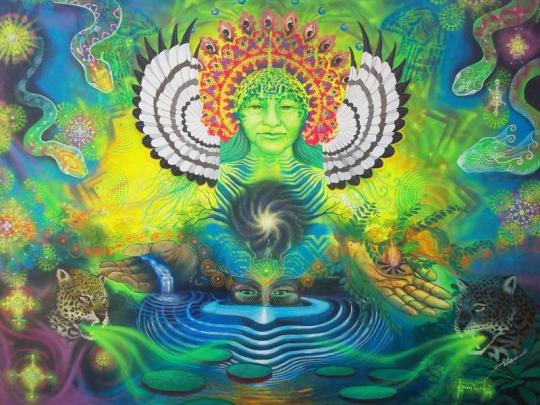
Puma and Condor
Pachamama is often associated with Snake (or Serpent in the form of a Dragon), but She also has several other Animal Totems which are important to Her. I will focus on the two I have met on my journeys with Pachamama, Puma and Condor. Puma first came to me in dreams and meditations prior to my meeting with the Goddess, almost as if She was sniffing me out to determine if I was worthy. When I finally met with Pachamama, the initial encounter was brief. “Follow the Puma” was all She said. Puma is an archetype of Kay Pacha (Pachamama in Her Earth Mother aspect). Puma is sacred to the people of the Andes. The city of Cuzco, Heart of the Inca empire, is in the shape of a Puma and Lake Titicaca is translated as Lake of the Stone Puma. Puma is one of four totem animals that are found at Machu Picchu ( the others being Snake, Condor and Bear).
The Andean people believe that we are entering a special age and that more Puma People are incarnating, the Puma Runa. Puma People bring balance and purpose to all they do. They see little difference between their spiritual quest and their everyday life. A potential Puma lives in each of us. As puma walks alone, so part of our spiritual journey is alone. The great teaching of the puma is that it is the animal with the least ego, never seeking to be seen. You don’t see the puma, only where it has been. Puma reminds us to move forward with faith and courage, to stop procrastinating with respect to important tasks. Puma teaches us to be clear and assertive in our beliefs and brings balance to our personal power.
The Condor accompanies Pachamama and is symbolic of Her role as crone or as Janai Pacha (the Sky). She is known as the Eagle of the South. In Andean myth, Condor oversees the flow of life, birth and death of galaxies. This silent flyer is the voice of the Great Mystery. Condor is our messenger from the Cosmos and connects the reality of the Light Beings to our own. It is a symbol of seeing the perfection of all of creation without judgment. Its positive energies help us in shedding aspects of our selves that are no longer useful as well as experiencing the magick of spiritual flight. Condor is seen as honouring the sun as it spreads it wings to dry the dew upon waking at dawn. Its ability to ride the thermal drifts is likened to seeing the auric field. It is a symbol of purification, death, rebirth and new vision.
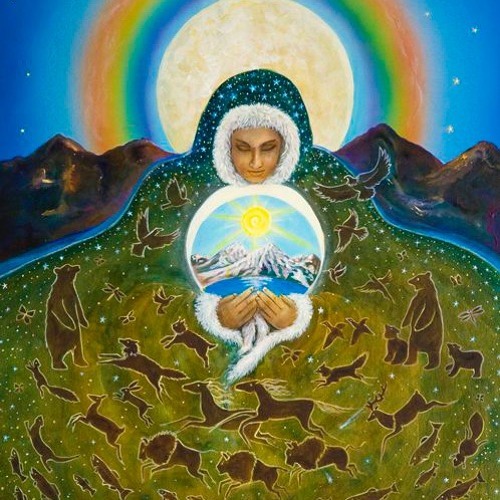
The Pachamama Alliance
When the Condor of the South meets the Eagle of the North, the Earth will awaken. This Inca prophecy is being fulfilled as more people from North America (the Eagle) are coming to understand and appreciate the indigenous cultures of South America. The Pachamama Alliance, established in 2004, is a partnership between a group of people from the modern world and the leaders of remote indigenous groups in the Amazon region of Ecuador. It came about over concern for the destruction of the Rain Forest and the impact this is having on the entire planet. The Pachamama Alliance believes that our ability to meet the challenges that face humanity as we make the transition to the next millennium, depends on our ability to successfully combine the best elements of . . . the intellectual and scientific prowess of the modern world, with the deep and ancient wisdom of traditional cultures. This is the commitment which underlies the work of The Pachamama Alliance. 8) We must all do our part to heal the Earth for She is Mother of us all. https://www.pachamama.org/
Guided Meditation
You have walked far through the jungle to reach this place. You have sensed a presence near you for some time, just out of sight, watching you. You have faced your fears and now you emerge from the dark jungle onto a mountain top plateau bathed in bright sunshine. Below you are the ruins of an ancient city, Machu Picchu. You walk down the trail to an ancient aqueduct. Water has flowed from these stones for centuries. You cup your hands and drink the cold, refreshing spring water. You find your strength renewed as your fatigue vanishes. In the distance, you notice a large stone monument. You are drawn to the stone and walk toward it. You find it rests on a rock base and you sit down with your back to the stone and close your eyes. You feel a movement coming from the stone. You lean into the stone, enjoying the vibration that moves up your spine and out the top of your head.
You sense a shadow pass over the warm sunlight and you open your eyes. A large black dot traverses the sun, gently wafting down in a slow spiral. You watch in wonder as the giant condor circles down ever closer toward the earth. As it touches the ground in front of you, it transforms into a Woman. She is tall with wild dark hair, a cloak of condor feathers about Her shoulders. Tufts of white llama wool at Her wrists and ankles and Her skirt is of finest woven alpaca wool. Her beautiful ample breasts are bare on Her dark skin. A Puma walks at Her side, watching you. The Woman smiles and a name comes to you, “Pachamama.”
“This is my Stone” She says, indicating the large monument behind you. “Are you prepared for an adventure?” You nod and She encourages you to turn and place your palms upon the Pachamama stone. You immediately sense the vibration emanating from the sacred stone and find your body humming along. “This is the song of the Spheres, the sound of the universe, OHM . . . You resonate with the sound, adding your voice to the sacred OHM. You chant until you feel your entire being vibrating with the stone. Pachamama asks you to place your forehead against the sun-warmed stone. As your third eye contacts the stone, you are surprised by the intense electric jolt that passes through you. You sense your visionary eye awakening.
You turn to face Pachamama and She opens Her arms to embrace you. As She enfolds Her mighty wings about you, you sense gravity pull away. Pachamama has taken flight with You in Her arms. You gaze in wonder at the ancient city of Machu Picchu, far below you now, as you soar higher above the Andean mountains. From up here the mountains look like the back of a spiny dragon. “This is Who I Am” She whispers. You continue to fly higher into the sky and as you look behind you, you see the Earth as a sparkling Blue-Green Jewel. “This is Who I Am” She laughs. You fly out past the planets and stars to the farthest corners of the Universe. “This is Who I Am” she shouts.
She takes you back to the beginning of time and space, you are a midwife to Pachamama as She births the universe into existence. “This is Who I Am” she screams. You follow the births and deaths of the stars and planets and catch glimpses of your own past lives being born and dying and being reborn. You turn to look at Pachamama and see Her eyes are your eyes, Her face is your face. “This is Who I Am” you whisper.
You find yourself back at the Pachamama stone. You find a gift for Pachamama in your hands. You leave it on the Stone platform. You find that She has left you a gift. You pick it up and hold it to your heart.
“This is Who I Am”
Ritual for Pachamama
So many of us have experienced angst when we think about the ultimate questions. What lies beyond death? Are we alone in the universe? What does eternity feel like? When I was a child, I had a recurring vision. As I lay in bed, my mind would transport me to the far reaches of the universe. I would become lost in the vastness of space and eternity. I could not comprehend what it meant, all I knew was that it frightened me, I was too young to understand. I realize now what a gift this glimpse into the vast emptiness of space-time was, but I continue to struggle with what it means to me, and my childhood fears have often prevented me from seeking further. I believe Pachamama has come into my life to teach me what I was meant to learn so many years ago and I have designed this ritual to help me overcome my childhood fears and connect to Goddess in a more profound way.
If possible, do the ritual outdoors where you can create an apacheta (e.g. a small corner of any garden). This also allows you to look up into the starry sky and truly get a sense of infinite space and time as many stars you see tonight have already lived out their lives. For this ritual, the intent is to delve into the mysteries of Space-Time to better understand ourselves and to discover our purpose in this life. Begin the ritual on the cusp of Friday night (the first Friday of the month is sacred to Pachamama) and into Saturday morning (to connect with the energies of the unknown, death and time)
Supplies
Candles--Red candle to represent Pachamama and a black candle to represent the unknown, place both in the center
Symbols for the four direction. I have placed a crystal in the North, photo of a Condor in the East, a small, red candle in the South, and a bowl of spring water in the West.
Small trowel/spade for digging
Offering to “feed” Pachamama (corn, flour, cakes, libations...)
Small object to symbolize intent -place next to the black candle. I chose an Ourobouros (serpent swallowing its tail) as a symbol of eternity.
Several small pebbles Incense- Basil (sacred to Dragons) and Sage (immortality, wisdom)
Cleanse in a bath sprinkled with Basil and Sage. Light the Red candle and Cast the circle. As you light the Black candle, place within it the thoughts and fears that keep you from your Path.
Call on the four directions, guardians or angels.
Face the South, this direction is sacred to Pachamama
Invocation to Pachamama
Oh Pachamama
Queen of the Universe
Mother to the Stars
You birthed time in Your great Womb
Oh Pachamama
Enlighten me with Your secrets
That I may know myself better
Guide me as I seek truths within and without
Oh Pachamama
Teach me to overcome my fears
Nurture my growth as I seek the unknown
Encourage me to face challenges
Oh Pachamama
I wish to share Your knowledge
I am ready to learn without fear
Mother, your child is here
Meditate on what eternity means to you. Spend some time connecting to Pachamama in the vastness of Space-Time. Sense your own connection to the Universe. When you are ready, hold the object to the four directions and say “I place within this object my intention to learn the secrets I have kept from myself. I ask Pachamama to guide me in my quest to seek the truths that lay beyond and within.” With the trowel, dig a small hole in the Earth. Place the object of your intent in the apacheta along with the ritual foods. Cover the well with pebbles. To maintain your connection to Pachamama, you may want to place pebbles on the apacheta on the First Friday of every month.
Give Thanks, Open the Circle and Ground.
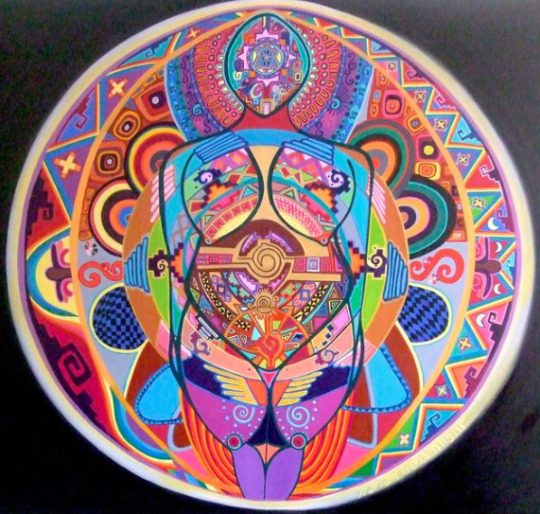
#mother goddess#divine feminine#pachamama#religion#inca#consciousness#meditation#spirituality#ritual
24 notes
·
View notes
Text
“March was women's History Month, and in the wake of the graduation-dress debate, Marlborough confronted self-image with a special all-school assembly featuring Dr. Joan Jacobs Brumberg, a professor at Cornell University. Dr. Brumberg had written two books about the collision between cultural pressures and a girl's sense of herself, Fasting Girls: The History of Anorexia Nervosa, and The Body Project: An Intimate History of American Girls. The title of her speech was 'From Corsets to Body Piercing.'
…
She started out with a rattling set of statistics: By the age of seventeen, according to her research, 78 percent of American girls reported that they disliked their bodies. Girls as young as eight and nine complained to their pediatricians that they were fat and needed to go on a diet.
Teenage girls had become 'appearance junkies, valuing their appearance over creativity, intelligence, generosity, kindness,' said Dr. Brumberg. 'And there's anecdotal evidence, though its not yet established in the literature, that it's worse in southern California than anywhere else in the country.’
There was in this country an epidemic of what she called 'bad body fever,' and she believed that they only way to eradicate it was to confront it. To bolster her argument, she read excerpts about New Year's resolutions from two different girls' diaries. The first spoke purely in terms of personality traits she wanted to improve, while the second girl wrote about how she wanted to look and what she hoped to buy. 'One diary projects good works,' said Dr. Brumberg. 'The other projects good looks.' The first diary, one of the ones she had collected for The Body Project, was from 1892; the second, the one that focused on appearance, was from 1982. The implication was that today's young women had replaced moral concerns with a narcissistic set of desires. 'So what's happened?' Dr. Brumberg asked her audience. 'Can we blame it all on Calvin Klein, on advertising? Can we blame Hollywood? MTV? Are you the first generation to feel this way? What was it like in the past to get your period, to develop acne, to start to feel sexual?'
She presented a slide show of 20th-century photographs and advertisements, designed to illustrate how the media defined femininity. She wanted the girls to see just how aggressive the message was, how pervasive the cult of physical beauty. If they understood the pressure they were under, they would be better able to defend themselves against it.
…
Katie Tower and her friend Lisl came because they were furious. To them, all this talk of 'bad body fever' was a colossal insult, no better than a racial or religious slur. What right did a stranger have to suggest every girl in the auditorium was neurotic about her appearance?
For the first ten minutes, the lunchtime session was a polite round of agreeable sentiment: Several girls wanted to talk about advertisements they hated, and one devoutly embraced the idea of 'being more aware of ourselves." Dr. Brumberg referred to herself as 'unlean,' and the girls chuckled. Dr. Morgan and Les Klein hovered in the background with a parent who had offered to serve as Dr. Brumberg's chaperone for the day.
Finally, Lisl could stand it no longer. She had strict criteria for true gender equality, and she saw insidious threats where most of her friends did not. She believed in hygiene-- her long, straight strawberry blond hair was always shiny and clean-- but beyond that, she took an almost belligerent stance about her appearance. She rarely bothered to tuck in her uniform shirt, and she preferred dark slacks to the more popular short skirt over boys' boxer shorts. She often wore a school blazer, as though happy for the extra camouflage, and favored heavy, lug-soled shoes.
To her, all this talk about looks was somebody else's problem. It had nothing to do with her life. She was going to Brown University and intended to become an engineer. Gender and looks were irrelevant to that. In fact, she found Dr. Brumberg's presentation to be condescending-- a double standard masquerading as a commitment to equality.
'Using the terms like bad body fever and stuff, I think you're really emphasizing negative aspects,' Lisl said. 'Putting all this emphasis on how the female appears, and what the teenage girl appears to be. My question to you would be, Do you think you're adding to it? When you speak so fervently about how we have to stop this, or look at the impact-- don't you think you're simply adding to it?'
Dr. Brumberg was startled by Lisl's question. She picked her words carefully. 'I'm a historian,' she said, 'and I'm reporting on what the clinical establishment is saying. Do you follow what I'm saying? I didn't do the research. The data show-- and it may not be your problem, all right?-- that women in America are dissatisfied with themselves, and that they're more demanding about physical appearance than any other aspect of their lives: their creativity, their athleticism, their sociability, their relationships.'
Her voice tightened up. 'I didn't make that up, okay? I'm trying to explain why we might have come to that position. I'm not chastising you."
Lisl refused to yield. 'Doesn't dissatisfaction create change, though? So wouldn't that be beneficial change? Maybe we're in sort of a time of change.'
Dr. Brumberg cut Lisl off. How could anyone consider a negative self-image to be a tool of progress? 'Dissatisfaction about your body,' she said, incredulous. 'You think that is going to generate social change?'
'About whatever,' said Lisl. 'Any dissatisfaction moves people to change things.' She accused Dr. Brumberg of acting as though beauty were a bad thing, and attention to hygiene and athletics, evidence of a superficial nature. Perhaps girls were simply being practical about how the world worked. She brandished a magazine ad that touted yogurt. 'Look at this,' Lisl said. 'It says, 'You need yogurt or else you're not going to get a date.' In some ways isn't that true?' The girls Lisl knew who had boyfriends were slimmer and prettier than the other girls. Maybe the ads were merely a reflection of reality, not an attempt to define it.
Dr. Brumberg and the teachers hardly expected such antagonism, and Lisl was not finished. What really infuriated her was the implicit suggestion that Marlborough girls were no different that anyone else.
'We heard you say that external appearance came in lieu of good deeds and actions and stuff,' she said. 'I don't think you can say that vanity has totally disappeared from Marlborough's campus, but we're heavily motived people here. Its hard for us to look at somebody who's omitting that part of our life and saying--'
Dr. Brumberg cut her off. 'You're taking the thesis of my book as somewhat of an insult,' she said.
'I'm not,' said Lisl. 'I'm just explaining to you, since you seem rather surprised-’
'You regard it as a charge that women of your generation are shallow.'
'Its personal,' said Katie. 'Maybe I feel better in makeup or certain clothes.'
'What's wrong with enjoying it?' chimed in another girl.
'There's nothing wrong with enjoying it,' replied Dr. Brumberg.
'That's the way you're coming off,' said Lisl.
Dr. Brumberg appealed to Dr. Morgan, who had arranged for her visit. 'In fairness to me,' she said, ' have these people read my book?'
Dr. Morgan sighed. One assigned chapter.
Dr. Brumberg decided to make her case one last time. 'The book is about the way in which in the twentieth century, not just young women but everybody, regards the body as perfectible,' she said. 'That's a change in our intellectual psyche. If you deny that the body is a critical piece of your self-identity, I think you're being pretty defensive. Your parents watch their cholesterol. Your grandparents may be counting their fat grams. This is the kind of culture in which we live. My charge is not that you're shallow and you don't have other interests. What I'm telling you is that if you looked at these diaries the way I have, from the 1830s to the 1980s, you'll find there is a big difference in the way girls think about themselves.'
Her stern tone of voice was a warning. As the session drew to a close, she would not tolerate interruption.
'This is not an argument against makeup, against earrings, against getting dressed up and taking care of yourself,' she said. 'But you are a little blind and a little defensive if you can't admit that there are people in this culture who become appearance junkies. I'm not saying you are all like that. I'm not saying you can't do wonderful things….I'm just telling you that girls beat themselves up today about appearance in ways they didn't in the nineteenth century. That's the thesis. If that is threatening and upsetting to you, I'm quite surprised.'
…
Her audience was plainly skeptical. For six years, they had lived in a world that considered them capable. The last thing they needed to hear, as they waited out the final weeks before the college letters arrived, was that they carried an internalized flaw, like a damaged gene, that rendered them not quite good enough: lacking in depth, concerned with frivolous things.
Their nerves were too raw to appreciate Dr. Brumberg's study. All they heard was a middle-aged woman telling them that they were narcissists. She was the universal bad mother, wagging a disapproving finger in their faces, and they simply did not want to hear what she had to say.
Erica's friend Chrissy, a gracious, soft-spoken girl, tried to lower the temperature in the room with a confession. People were always telling her she was not thin enough, or needed more makeup, or ought to color her hair, 'and they say its not for yourself-- its so a boy will like you.'
One of the other girls cut her off. There was no way to rid the world of people who said stupid things, but a smart girl refused to listen-- and she surrounded herself with like-minded people. A Marlborough girl did not need instruction. She just needed other girls who understood.
'You need a friend to say, 'No, no, you're plenty thin,' said one senior. 'Girls need to say that.'”
All Girls: Single-Sex Education and Why It Matters, Karen Stabiner. 2002.
8 notes
·
View notes